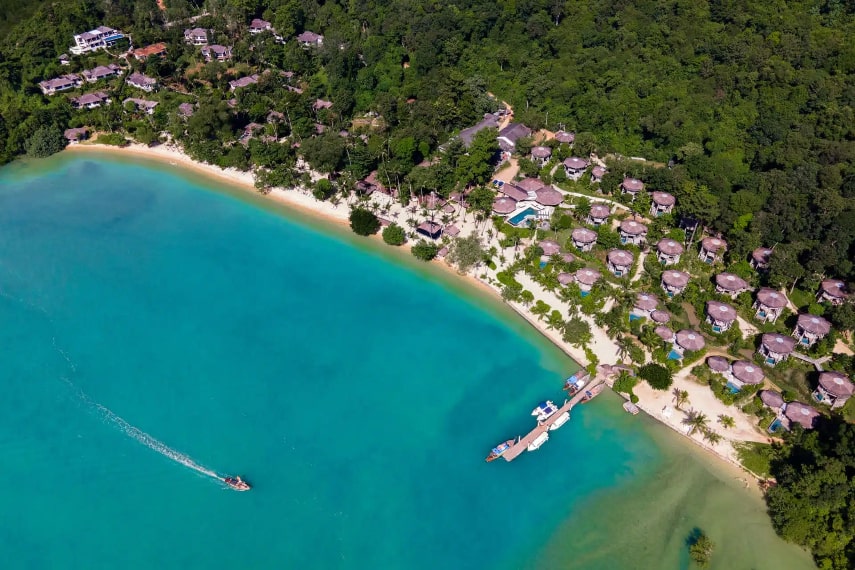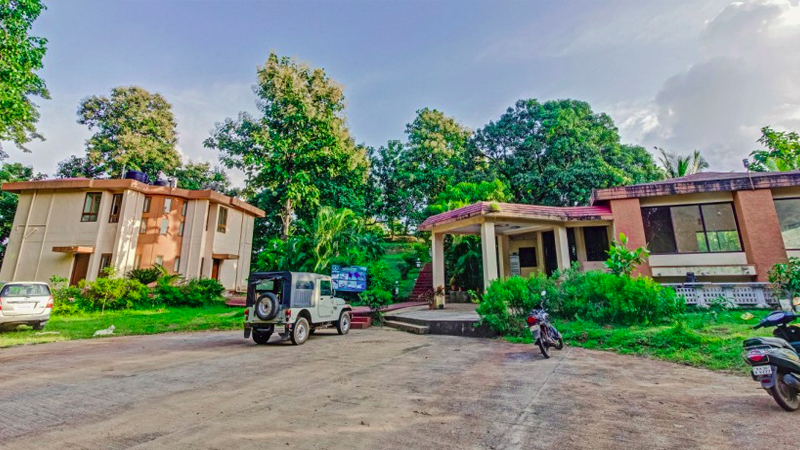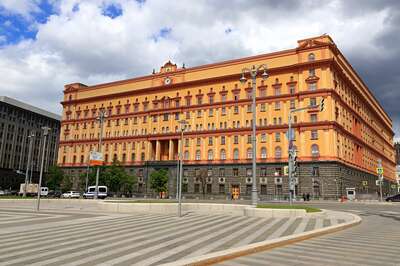- Search Please fill out this field.
- Manage Your Subscription
- Give a Gift Subscription
- Sweepstakes
- Hotels + Resorts

The 14 Most Beautiful Jungle Hotels Around the World
These hotels in the jungle will surround you in stunning nature and wildlife.
Anne Olivia Bauso is a travel writer and hotel expert based in New York City. She has written hundreds of hotel reviews, from 5-star Ritz-Carlton properties to treehouse eco-resorts in the jungle.
:max_bytes(150000):strip_icc():format(webp)/Anne-Bauso-2000-8c0841f66c18478e9f0db9218da1109a.jpeg)
Calling all eco adventurers: If your dream vacation involves braving a private suspension bridge into your Costa Rican canopy villa, scanning the treetops for brilliantly plumed birds as you go, or trekking through wild Rwandan terrain in hopes of spotting an elusive mountain gorilla, then we have hotel ideas for your next big adventure.
These unique lodges and eco-resorts around the world offer complete seclusion and total immersion in their jungly, wildlife-filled paradise surroundings.
Gaia Amazon EcoLodge, Ecuador
This rustic, 20-guest lodge offers simple rooms, cabins, and open common areas overlooking the thick, wildlife-filled greenery and meandering waterways of the Amazon. Its eco ethos and remote location deep in a forest of cacao trees provide a genuine connection to the near-mythical surroundings.
Even stays as short as one night include all meals and guided activities like rain forest trekking, chocolate-making classes, and a (motorized) canoe tour down the Napo and Arajuno rivers. However, you should really stay longer to add a butterfly farm, shamanic cleansing ritual, and much more to your itinerary. It's a place of such beauty and peace that nearly everyone who visits is profoundly moved by the experience.
Shinta Mani Wild — Bensley Collection, Cambodia
This luxury tented camp 's home in Southern Cardamom National Park is one of Cambodia's few surviving habitats for wild elephants, monkeys, and other endemic species. The eco-camp sits in a private nature sanctuary within this vast untouched wilderness. You get there by way of chauffeured vehicle and army jeep, and if you really want to make an entrance, you can do so flying over the forest on the in-house zip line, with a cocktail on the other side to welcome (and congratulate) you.
The camp's seclusion and mission to protect the area from poaching, mining, and logging are what make it truly special, though its dining, adventure programming (both included in the rates), service, and Bill Bensley-designed luxury tents along the riverbank more than hold their own. A typical day might include tracking gibbons, a foraging and cooking workshop, and joining a Wildlife Alliance anti-poaching patrol through the woods or a boat expedition along the winding waterways.
Wilderness Safaris Bisate Lodge, Rwanda
Bisate Lodge sits on a semicircular slope (the eroded remnant of a volcanic cone), a shape that fittingly provides clear views of Volcanoes National Park and its eponymous landforms. On top of the special setting, the resort (rightfully) prides itself on its jaw-dropping architecture: spherical wood, brick, and thatch villas tucked into the forest, each with views of the volcano. The hotel facilitates daily treks to encounter silverback gorillas and golden monkeys in their natural habitat and encourages guests to plant indigenous trees in the garden.
Sample delicious Rwandan-influenced international dishes, prepared with a farm-to-table philosophy and local ingredients like kale, chilies, avocado, climbing beans, wild honey, and an endless array of fresh fruits.
Mango Bay Resort, Vietnam
Large-scale development in the early aughts transformed Phú Quốc, Vietnam's biggest island, from a remote jungle paradise to a hotbed of tourist activity: big-brand hotels, five-star resorts, clubs, and even casinos. There is an eco-minded flip side to all that tourist hubbub, one exemplified by places like Mango Bay . The beachside bungalow oasis was built using sustainable materials, including local woods and rammed earth. Dedication to energy, water, and nature conservation is found at every corner, from composting to low-water toilets in the (open-air) bathrooms to beds cooled by a low-energy alternative to traditional AC.
Aarunya Nature Resort & Spa, Sri Lanka
The name of this eco-lodge alludes to the Sanskrit word for "first rays of the sun," and it's an apt reference. Aarunya's east-pointing hilltop perch affords the sight of sunrise breaking through the mist of the Knuckles Mountain Range, a UNESCO natural treasure covered in dense forest. Contemporary villas and suites are sprinkled across seven acres of jungly garden grounds; many have hot tubs and pools and all have incredible views of the mountains and forest. Wander among the cinnamon, coffee, pepper, banana, clove, and avocado trees; try an ayurvedic spa treatment; or defy gravity (at least imagine you are) in the infinity pool.
Pacuare Lodge, Costa Rica
Sister resort to Lapa Rios, Costa Rica's first eco-lodge, Pacuare Lodge is a sustainable nature retreat fully immersed in virgin rain forest. So immersed, in fact, that the check-in process typically involves rafting down Pacuare River to the lodge (4x4 arrivals can also be arranged).
Like Lapa Rios, transportation (from and to San Jose), three meals and afternoon coffee and treats, and a range of on-site activities are included in the rates. Zip through the treetops on a canopy tour, try canyoning in a narrow jungle gorge, and attend bird-watching walks (your telescope-equipped guide will point out colorful toucans and elegant sunbitterns) and guided hikes through the 700-acre private rain forest reserve.
Jungle-ensconced luxury villas have features like outdoor showers and spring-fed pools; the Jaguar Villa has its own bridge over the river and tree platform, while the spectacular Canopy Villa — perhaps just the coolest hotel room in Costa Rica — is reached by a private suspension bridge and offers 360-degree views over the jungle and river.
Islas Secas, Panama
Twenty-three — that's the max number of fellow guests you'll encounter at this private island eco-lodge , 20 miles off mainland Panama's Pacific coast. The resort's jungle-clad casitas are all about bridging their indoor space to the outdoor world. There are five room types (including several multi-casita options for a dream family vacation), all with chic style, outdoor soaking tubs or private pools, and nice touches like Panama hats and binoculars for exploring the island and its archipelago. How to go about that? Scuba diving, snorkeling, swimming with turtles, gliding over the clear water on an electric surfboard, and enjoying a beach lunch at UNESCO-listed Coiba National Park. Over pre-dinner cocktails at the Terraza, you might chat with your (few) casita neighbors and get ideas for the next day's itinerary.
The Datai Langkawi, Malaysia
Set in mountainous rain forest near a secluded bay, The Datai Langkawi is a veritable jungle escape with gazebo-like rooms, suites, and villas perfectly in tune with their environment. Every category is designed with big bathrooms built around giant soaking tubs and verandas for watching the dusky leaf monkeys chasing each other through the canopy. For the best of both worlds — beach and jungle — opt for a butler-serviced Beach Villa, where elaborate sleeping and lounge areas are connected by breezeways and terraces.
The hotel leads butterfly walks, marine biologist-helmed mangrove kayak tours, and daily nature treks with a resident naturalist to meet hornbills, macaques, lizards, and other native rain forest residents. After, claim snorkel gear or a sunbed on the one-mile golden beach, shaped like a C and backed by palms.
Copal Tree Lodge, A Muy'Ono Resort, Belize
Copal Tree is an upscale jungle lodge, yes, but it's also a working certified-organic farm spanning 3,000 acres on the Belizean coast. The 16 suites and bungalows feature lofted ceilings with overhead fans, jungle-view floor-to-ceiling windows in the showers, and screened-in porches strung with hammocks.
Favorite activities include kayaking down the Rio Grande, snorkeling in the Caribbean, fishing trips (and bringing back the catch for the chef to cook), bird-watching, chocolate-making classes, and tours of the on-site coffee/spice farm and zero-impact rum distillery. (The lodge's sustainable Copalli Rum is part of a small group of certified organic rum distilleries in the world.) And there's always simply sitting by the pool or on your back porch, gazing at the exuberant green and listening to the sounds of the jungle.
Soneva Kiri, Thailand
Soneva Kiri takes the concept of "getting away from it all" to a new level — even for a secluded island resort in Thailand. Guests fly in the hotel's eight-seat plane to its private airstrip, then finish up the journey on a speedboat to the hotel. Once on the island, they get their own buggy and "barefoot butler." The 34 earth-friendly wood villas are well spread out across the jungle grounds, from down at the beach to up on a cliff. No matter the location, you can expect ample outdoor space with pools, open-air bathrooms, and plenty of deck square footage.
Two things not to miss are the ecologist-led waterfall hike and a meal in Soneva Kiri's "treepod" restaurant — a nest-like bamboo capsule suspended high in the rain forest, where a server delivers food and drink via zip line.
Secret Bay, Dominica
Dominica is a long way from the side of the Caribbean defined by busy cruise ports and mega-resorts. The Leeward island has flown under mass tourism's radar, so its natural world — steaming hot springs , sunbathed beaches, volcanoes blanketed in jungle — is largely untouched.
The romantic villas scattered around Secret Bay are among the best rooms on the island. Sustainably built from Greenheart hardwood, each luxurious house features a plunge pool and sun deck where you can cool off with an iced lemongrass tea. Inside (or outside, for some lucky villa guests) are modern kitchens stocked daily with an organic breakfast basket. Villa hosts are standing by via text to bring treats, arrange island excursions like spearfishing and sunset sailing, and just keep everything easy and seamless. Arrange a boat ride to the resort's hidden beach, on the far side of the cliff from the main private beach.
Mandapa, A Ritz-Carlton Reserve, Indonesia
Situated in the emerald Ubud jungle, Mandapa is one of the most lavish (and well-loved) resorts in the region. The layout is designed to resemble a traditional Balinese village and many of the on-site features are superlatives in Ubud. Two examples are the resort's riverside Sawah Terrace and Kubu restaurants (where you sit in a beehive-shaped bamboo cocoon), both among the best fine-dining options in town.
Starting at 1,075 square feet, the 60 suites and villas are categorically large and luxe. All come with 24-hour butler service and outdoor space looking toward the rain forest, rice paddies, or Ayung River. Villa upgrades get you a whopping 3,500 additional square feet of space, including a private Balinese garden, pool, and outdoor shower.
Rio Celeste Hideaway Hotel, Costa Rica
Costa Rica has no shortage of jungle hotels, nearly all of them independent, green-minded, and simply amazing. The enchanting Rio Celeste Hideaway Hotel gets a special mention for its proximity to its namesake river in Tenorio Volcano National Park. Rio Celeste is hidden in a less-traveled corner of Guanacaste Province, but those who make the trek are rewarded with waters, hot springs, and a large waterfall distinct for their ethereal, milky teal hue. The hotel's generous villas are set within the rain forest, and its sizable network of private trails near and along the river gives nature lovers ample opportunities to explore the area's "FernGully"-like flora and fauna.
Meghauli Serai, A Taj Safari , Nepal
Your first thought of Nepal may be strenuous hikes at head-spinning altitudes. Yet at the foot of the Himalayas lie jungly, subtropical lowlands that are home to one-horned rhinos, elephants, crocodiles, and majestic Bengal tigers. This 30-room luxury safari lodge is set along the river in Chitwan National Park, whose rich animal life earned it World Heritage status. Naturalist-led safari excursions are available by foot, canoe, and jeep to explore the surrounding forests, marshes, and grasslands (with the mighty Himalayas as a backdrop). Activities are included in some packages; otherwise, you can add them a la carte.
9 Rainforest Resorts That Put You Right in the Jungle
By Ali Wunderman

Nothing lights up the imagination quite like the thought of traversing the jungle. Standing under towering canopies, surrounded by dense foliage and avian symphonies, rainforests elicit a sense of wonder and connectedness with nature unlike any other biome on earth. While they only cover three percent of the planet, rainforests are home to more than half of Earth’s animal and plant life, making them a top destination for adventurous nature lovers.
A journey to the jungle may seem like a fantasy, but we’ve researched a handful of hotels that make it possible—without compromising environmental responsibility or luxury amenities. Read on for nine upscale resorts that transport guests into the rainforest. Whether your travel plans are taking you to the Amazon, remote regions of equatorial Africa , or tropical island escapes, we have an accommodation for you.
All listings featured on Condé Nast Traveler are independently selected by our editors. If you book something through our links, we may earn an affiliate commission.

Four Seasons Tented Camp Golden Triangle Arrow
The Four Seasons Tented Camp Golden Triangle, a luxury resort peeking out of the jungle, borders both Burma and Laos in Northern Thailand. Tented accommodations mesh with the surrounding environment, with private outdoor hot tubs, river views, and infinity pools to make relaxing in nature a seamless experience. Foraging for food and medicinal plant walks are just some of the ways the hotel connects guests to this unique jungle environment.

Bwindi Lodge
The jungle experience doesn’t get much more immersive than the Bwindi Impenetrable Forest in Uganda. Volcanoes Safari’s Bwindi Lodge is perched just above the forest canopy, offering dramatic views of the primeval forest and access to trekking with the mountain gorillas that live within. The luxury lodge prioritizes the preservation of this exceptional ecosystem, in part by working with the local community through its Partnership Trust . Ten bandas are available for booking, and they each include butler service and a 30-minute massage for each guest.

HBD Sundy Praia Príncipe Island
At first glance, the idyllic coast of Príncipe, a tiny island off the west coast of Africa, only reveals white sand beaches, cerulean water, and copious palm trees. But that’s the way the HBD Príncipe’s hotel founder Mark Shuttleworth designed it. Take a closer look, and you’ll find that Sundy Praia’s 15 luxurious tented suites are inconspicuous among the foliage. HBD’s guests are immersed in Príncipe’s rainforest, which was moments away from being converted into a palm oil plantation before tourism arrived a decade ago.

Maruia River Retreat
The South Island of New Zealand is the country’s adventure hub, and the Maruia River Retreat capitalizes on the expansive nature of the region. The retreat features seven luxury villas nestled among a 500-acre nature estate, on which guests can privately enjoy the surrounding beech forest. There is no shortage of gourmet food and luxury treatments to help guests kick back—forest bathing, guided walks, and restorative spa treatments are just some of the ways retreat-goers can expect to facilitate their rejuvenation in the jungle.

Laura Walsh

Alex Erdekian

Charlie Hobbs

Copal Tree Lodge
The tiny Central American country of Belize has a wide range of environments—including reefs, caves, Mayan ruins, and waterfalls—but its densest jungle is found in the southern region of the country near the town of Punta Gorda. Barely visible among the lush treetops is Copal Tree Lodge, a luxury eco-resort surrounded by 22,000 acres of preserved rainforest. Guests stay in one of 16 suites or a three-bedroom villa, and can expect to spend breakfast with howler monkeys and toucans. The property is also home to a 3,000-acre sustainable farm that produces chocolate, coffee, and Copalli Rum.

Silky Oaks Lodge Arrow
Australia isn’t just home to a vast red desert and metropolitan cities—there is also plenty of dense jungle to be found. In Queensland, the Daintree Rainforest is a tropical destination home to the Silky Oaks Lodge, a luxury hideaway with 40 treehouse suites that integrate guests into the landscape. Keep an eye out for any one of the 315 mammal species living in the Daintree, 13 of which are endemic, like the Boyd's forest dragon. Signature experiences include exploring the Mossman River, and taking a dreamtime walk with a guide from the Kuku Yalanji community, who were the original stewards of this land.

Mashpi Lodge
Sixty miles northwest of Quito is Mashpi Lodge, a luxury escape built around the topography of Ecuador’s cloud forest. Every room has floor to ceiling windows, which when combined with the lodge’s open-air terrace, a canopy-skimming sky bike, and nature activities, means guests never forget that they are enmeshed in the rainforest. Some 400 wildlife species—including 36 endemic ones—call the reserve around Mashpi Lodge home. The dining is another highlight of the Mashpi experience: flavors of the Ecuadorian forests are utilized, such as wild garlic and chillangua. The hotel takes its responsibility to the region seriously, and as such, the staff is predominantly local to the area.

Hotel das Cataratas, A Belmond Hotel, Iguassu Falls Arrow
Belmond’s Hotel Das Cataratas is the only accommodation within the bounds of Iguazú National Park, home to the impressive Iguazú Falls. This pink hotel with 187 rooms has a picture perfect view of the falls, but the surrounding rainforest and its lush wildlife are not to be overlooked. This is a place to get submerged in orchids, serenaded by toucans, and pampered by Belmond, a brand known for its attention to luxury details. An experience exclusive to guests that should not be missed is the sunrise hike through the jungle to the falls.

Four Seasons Resort Bali at Sayan Arrow
The Sayan Valley is home to a sacred forest from which the floating lotus pond of the Four Seasons Sayan emerges. This hotel is world-renowned for its stunning architecture, and is built out of a lush hillside overlooking the Ayung River. A sense of being one with the surrounding jungle is evoked in the hotel’s terraced restaurant and pool, and in suites designed with Balinese decor. This iconic property has hosted the likes of the Obamas , and Julia Roberts stayed there while shooting Eat, Pray, Love.
- Greek Islands
- South Africa
- Philippines
- South Korea
- French Polynesia
- Dominican Republic
- Saint Vincent & the Grenadines
- Czech Republic
- Ras Al Khaimah
- Saudi Arabia
- A-Z Destinations & Map
- Escorted Group Tours
- Escorted Tours
- F1 Packages
- Family Holidays
- Golf Holidays
- Multi Centre Holidays
- Rail Holidays
- Short Breaks
- Solo Holidays
- Ultra Luxury Holidays
- Exclusive Deals
The 13 Best Jungle Resorts That Will Take Your Breath Away
Social share:.

Explore the untamed beauty of the world’s top jungle resorts, where lush rainforests and exotic wildlife meet unparalleled luxury. We’ve rounded up 13 of the best jungle resorts in the world, each offering a harmonious blend of opulence and adventure, for an escape like no other.
From canopy treehouses perched high above the forest floor to secluded riverside bungalows, these tranquil retreats across our favourite far-flung destinations provide a one-of-a-kind experience for nature enthusiasts.
Want to discover the magic of the wilderness without scrimping on comfort? Luckily for you, our list of the best jungle all-inclusive resorts allow you to immerse yourself in nature’s wonders during the day and unwind in beautiful accommodations at night.
Who’s ready to embark on the ultimate jungle adventure?
So let’s take a look at top Jungle Resorts in the World
1. the kayon jungle resort.

The Kayon Jungle Resort is crowned as one of the best jungle resorts in Bali. Nestled within the traditional Balinese village of Bresela, Payangan, this resort is just 25 minutes from the heart of popular tourist spot Ubud.
Aimed at honeymooners and wellness enthusiasts, this resort invites guests to laze in infinity pools overlooking the rainforest canopy, indulge in spa treatments inspired by local traditions, and devour local (and delicious) farm-to-table dining. If you’re interested in cultural experiences, guided treks through the verdant surroundings are recommended, sure to provide a deep connection with Bali’s natural beauty and spirituality.
From excellent accommodation to the Wanna Jungle Pool Bar, Kepitu Restaurant and multiple package offers available, you’re sure to have an unparalleled experience that suits you.
2. Hanging Gardens Of Bali

Nestled in the heart of Ubud, the Hanging Gardens of Bali is renowned as one of the best jungle hotels in the world. Perched on lush hillsides, the resort boasts iconic two-story thatched-roof villas, each with its own infinity pool overlooking the Ayung River’s verdant gorge. In fact, guests can dine whilst overlooking “The World’s Best Swimming Pool”, as crowned by Conde Nast Traveler.
In addition to its spectacular accommodations, you can expect impeccable Balinese hospitality, gourmet dining options, and a tranquil spa – sure to elevate your experience. A variety of special packages are available whether you’re experiencing jungle life with your own little monkeys or seeking a romantic escape for two.
3. Nandini Jungle Resort

A dramatic hideaway nestled in the lush Payangan rainforest near Ubud, a stay at the Nandini Jungle Resort is a journey into the heart of Bali’s natural beauty. This luxury retreat immerses you in a serene jungle paradise, perfect for weddings and honeymoons. Each of the resort’s suites and villas feature Balinese architecture that brings the outdoors in, plus private balconies providing guests with access to awe-inspiring views of the Ayung River and surrounding greenery.
Indulge in traditional Balinese spa treatments, explore the bamboo bridge, savour authentic cuisine by the river or in a chapel courtesy of Executive Chef Gusto, or simply relax by the infinity pool overlooking the jungle’s wonders.
4. TreeHouse Villas Koh Yao Noi

A stay at the TreeHouse Villas Koh Yao Noi is a journey to a tropical paradise. An adults only resort amidst lush vegetation and perched on stilts overlooking the Andaman Sea, these luxurious villas are designed to offer those with a love of the environment (and each other) a unique and intimate experience. Wake up to breathtaking ocean views from your treetop abode, complete with a private infinity pool – the perfect way to start your day.
There’s plenty to do around the resort, too. Immerse yourself in island adventures from authentic cooking classes on an organic farm to kayaking on the river and exploring stunning nearby beaches. Or, take a guided tour around the property and learn about the wildlife as you trek through the jungle to the famous Grandfather tree – don’t forget your camera! Know here more about TreeHouse Villas Koh Yao Noi .
5. Soneva Kiri

Staying at Soneva Kiri is a supreme experience. Nestled away on the pristine island of Koh Kood in Thailand (just 90 minutes from bustling Bangkok), this eco-luxury resort offers unparalleled seclusion and indulgence for those seeking sustainable travel.
Located in a tropical rainforest or on the sandy shores, guests will arrive at the resort’s spacious Bedroom Pool Villas, Bedroom Beach Pool Reserve or Bedroom Beach Pool Suite – each oozing ultimate comfort and blending with the island’s natural beauty. A family favourite, kids can whisk off to The Den – aka a giant bamboo playground shaped like a Manta Ray – for exciting and educational activities, while the adults unwind in the world-class spa.
6. 98 Acres Resort & Spa

A stay at 98 Acres Resort & Spa offers an elegant escape into Sri Lanka’s picturesque Ella region. Surrounded amid a 98-acre tea plantation, this aptly named eco-friendly resort offers cosy chalets made mostly with recyclable substances offering stunning views of the rolling hills and the iconic Ella Rock.
While you’re here, relax on your private balcony, explore hiking trails, or simply unwind in the infinity pool. The resort’s spa and fine dining options also provide a perfect blend of relaxation and culinary delight, creating a heavenly retreat in the heart of nature.
7. The Datai Langkawi

The Datai Langkawi is a tropical paradise perched on the pristine shores of Langkawi Island, Malaysia. Its luxurious selection of 121 villas, suites and rainforest chalets are nuzzled amidst beautiful jungle foliage – perfect for those seeking solitude. Guests can unwind on private balconies with picturesque views of the Andaman Sea and Tarutao Island or explore the ancient rainforest surroundings.
Facilities wise, the five-star beach resort offers a choice of gourmet dining experiences, a spa and wellbeing space, an award-winning 18-hole golf course, and various wildlife encounters. Want to combine luxury and nature for an unforgettable island escape in Southeast Asia? This is the place to do so.
8. Shinta Mani Wild a Bensley Collection

Shinta Mani Wild, a Bensley Collection, epitomises luxury forest resorts. Found in the heart of Cambodia’s pristine wilderness, this five-star resort offers a radical fusion of world-class design and unparalleled beauty within a conservation-focused concept. The lavish tents and villas available are perched along the riverbanks and boast the most breathtaking jungle views.
Here, guests can embark on a variety of thrilling adventures, from exhilarating zip-lining to river safaris, all while supporting wildlife conservation efforts. It’s a win, win. Gourmet dining and spa experiences are equally exceptional, and much needed after a busy day of exploration. Perfect for those seeking both a laid-back and lively stay.
9. Mango Bay Resort

The Mango Bay Resort in Vietnam offers a magical tropical experience. Perched on Phu Quoc Island, far away from the hustle and bustle of the city, it features a line-up of beachfront bungalows each with stunning sea views. Beach lovers can unwind on the tranquil sands, indulge in organic cuisine, or experience rejuvenating spa treatments – all within the resort’s verdant, tropical gardens.
If you ever tire of sunbathing on the beach, adventure seekers can explore coral reefs with snorkelling, take island tours, and enjoy a selection of exhilarating water sports – when a faster pace calls! The Mango Bay Resort combines natural beauty with eco-conscious practices, making it an ideal destination for both relaxation and outdoor activities.
10. Wilderness Safaris Bisate Lodge

The chance to stay at the Wilderness Safaris Bisate Lodge in Rwanda is a once-in-a-lifetime experience. Nestled in the heart of Rwanda’s Volcanoes National Park, you’ll feel worlds away from everyday life once you step inside one of the six lodges, each serving up luxurious forest villas with panoramic views of volcanic peaks beyond. It truly is a sight you’d expect to see on the front of a postcard.
A total haven for wildlife enthusiasts, this resort offers incredible activities from thrilling mountain Gorilla trekking expeditions to private safaris, conservation experiences, nature walks and cultural visits to nearby villages – a great way to get a taste of local life.
11. Secret Bay

Burrowed away on the unspoilt isle of Dominica, Secret Bay is an award-winning, intimate, six-star Caribbean escape – yep, you heard us correctly, six whole stars. Guests are welcomed by a host of luxurious cliffside villas, each with sensational sea views and private plunge pools to cool off in.
Activities include snorkelling in pristine waters, paddle boarding through serene bays, and exploring the island’s lush rainforests. The resort also offers a unique “Bwa Mang Wellness” experience, focusing on holistic wellbeing for those eager to channel their inner zen (not that it will be difficult in a gorgeous place like this).
With its emphasis on seclusion and natural beauty, Secret Bay is the perfect destination for a tranquil and rejuvenating Caribbean getaway.
12. Gaia Amazon EcoLodge

Want to journey into the heart of the Amazon Rainforest? At the Gaia Amazon EcoLodge, you can do just that. Located in Peru’s Tambopata National Reserve, this eco-friendly lodge offers comfortable accommodations, each oozing authenticity and designed to be luminous and airy – inviting the wonders of the outside forest, in. The views over the Napo River are pretty special, too.
A variety of programs are available for guests to embark on during their stay, from guided jungle treks to witness incredible wildlife and explore the vibrant flora to canoe river tours, birdwatching, artisanal chocolate making, and beyond. You can even visit an indigenous family or spend the evening stargazing, should you wish to. Whatever experience you’re seeking, you can bet your bottom dollar it will be a wholesome one.
13. Copal Tree Lodge, a Muy’Ono Resort

Copal Tree Lodge, a Muy’Ono Resort, is the luxury forest resort you never knew you needed to visit. Surrounded by 12,000 acres of the Belize Rainforest, Punta Gorda, this all-inclusive property is an award-winning, world-class destination in its own right – having spent years pioneering ideas around sustainable food production and agritourism.
Complete with a 3,000-acre farm, Copal Tree offers 16 private suites and one three-bedroom villa for guests to unwind in, plus a host of immersive experiences and activities sure to excite all ages with a love for nature. From learning about the production of coffee, chocolate and indigenous produce at the on-site
Farm Center to embarking on challenging jungle hikes, river kayaking, and fascinating Mayan Ruin visits – there’s something for everybody here.
So, there you have it, in the heart of nature’s embrace, we have walked you through the best jungle and forest resorts in the world, each redefining the art of luxury and adventure in their own unique way. From residing in the remote rainforests of Costa Rica to the pristine jungles and beaches of Southeast Asia, these havens offer a harmonious blend of beauty and wilderness in every corner of the world.
If you’ve caught the bug and fancy being “at one” with nature, our expert team at Affordable Luxury Travel are on hand to help craft your perfect jungle escape, from finding your accommodation to settling on a destination that best suits your requirements. Give us a call on 0203 023 7776 today to tailor your next adventure.
FAQs for Best Jungle Resorts in the World
A jungle resort experience guarantees an unforgettable adventure in nature’s natural habitat. Guests can enjoy luxurious accommodations immersed in the wild, with breath-taking views of lush landscapes. Days can be filled with wildlife encounters, spa treatments, guided treks, and eco-conscious activities, while the nights bring delectable dining and the soothing sounds of the jungle.
Yes, many jungle resorts are suitable for families with children. These resorts often offer family-friendly accommodations and activities such as nature walks, wildlife safaris, and adventure experiences suitable for all ages. Some also provide childcare and babysitting services, ensuring parents can enjoy their stay while kids have a memorable and safe jungle adventure. Please be sure to check with the specific resort for age-appropriate activities and amenities before booking.

Recommended Posts

Mardi Gras in New Orleans 2025: The Ultimate Guide
Mardi Gras is a vibrant and colourful annual carnival held in either February or March in New Orleans. The Mardi...

Escape the Chill: Top 13 Warm Destinations in March (2025)
The month of March marks the arrival of Spring. While the weather starts to warm up, don’t be in a...

12 Top Things To Do In Bali In 2024: For Tourists Of All Kinds
Bali, a tropical paradise, beckons with its enchanting beauty and a plethora of activities that promise an unforgettable escape. Picture...
Leave a Comment Cancel reply
Your email address will not be published. Required fields are marked *
Save my name, email, and website in this browser for the next time I comment.
- Affordable Luxury Travel Recommends
- Thailand Travel Guide
- Travel News
UK Public Bank Holidays & School Holidays 2024, 2025 & 2026
Where is hot in may in europe the 10 best places to go, july holiday destinations: the 14 best places to go, top 11 beaches in turkey for an unforgettable holiday, august holiday destinations: the 14 best places to go.
WHY BOOK WITH US
PERSONALIZED ITINERARIES
PRICE GUARANTEE
5-STAR REVIEWS
TRUST & EXPERIENCE
Subscribe to our newsletters to see the latest deals

Affordable Luxury Travel, based in London’s Fitzrovia, is the latest addition to the successful and long established Moresand Ltd.
IMPORTANT LINKS

QUICK LINKS

Our Key Industry Partners

© 2024 Affordable Luxury Travel. All rights reserved. A trading division of Moresand Ltd
Welcome Back!
Login to your account below
Remember Me
Retrieve your password
Please enter your username or email address to reset your password.

- Department of Tourism

+91-80-2235 2828
Sign up to newsletter

- Jungle Lodges and Resorts in Karnataka

Introduction
Jungle Lodges and Resorts Located in the southern half of the Indian subcontinent, Karnataka is a state that boasts of numerous sights of natural beauty along with an impressive amount of flora and fauna. Charming grasslands, dense forests, and glistening rivers are a common sight in the state. Due to the presence of an ocean in the vicinity, Karnataka enjoys maritime weather, with summer and mild winters. October through the month of April is the best time to visit if you want to witness exquisite flora and fauna.
If you want to explore the magnificent forests of Karnataka, nothing is better than staying at a jungle resort or camp. Top-notch experience along with never-ending thrill is some of the firm promises made by the jungle lodges and resorts that follow:
Anejhari Butterfly Camp

Anejhari Butterfly Camp is located at a distance of 80 km from Udupi, near Kollur. The camp allows visitors to discover the mysteries of Mookambika Wildlife Sanctuary. This camp is best suited for adventurers who love trekking; you can enjoy a trek to Kodachadri peak. The tranquil environment that surrounds that camp enriches you physically, mentally as well as spiritually. Two beautiful beaches like Byndoor and Maravanthe are located about 35 km from the camp.
Check here to Know More About Anejhari Butterfly Camp
Sakrebyle Elephant Camp

If you are a big fan of the majestic creatures, nothing better than the Sakrebyle Elephant Camp, which is located a few kilometers away from Shimoga. The camp is maintained and taken care of by the Karnataka Forest Department. Elephants receive the attention that they truly deserve in the Sakrebyle Elephant Camp. Elephants receive all kinds of treatments and training in this camp. Another attraction is the River Tunga with its clear water, located in the vicinity.
Check here to Know More About Sakrebyle Elephant Camp
Sharavathi Adventure Camp

A camp that amalgamates the serenity of forests and the thrill of mountains, located at a mere distance of 6 km from Jog Falls, the Sharavathi Adventure Camp is an extraordinary place to leave behind worries. The camp offers an opportunity to catch a glimpse of the charming interplay between sparkling sunlight and peaceful water. The light breeze flowing over the region is loaded with scents of trees and shrubs that fill up the senses and rejuvenate every vein in the body.
Check here to Know More About Sharavathi Adventure Camp
Kabini River Lodge

The lodge gets its name from River Kabini and is located near Nagarahole National Park or the Rajiv Gandhi National Park. Tourists can enjoy breathtaking views from this place and can often witness the presence of gaur, deer as well as elephants. Jeep safari, boat rides, are some of the activities open for visitors.
Check here to Know More About Kabini River Lodge
Bandipur Safari Lodge, Bandipur

Bandipura Safari Lodge
Tucked snugly in the fringes of the Nilgiris, Bandipur is a place for wildlife seekers. Originally used as a hunting ground by royals, the place is now frequented by deer, elephants, and peafowls. The Bandipur Safari Lodge captures the true essence of wildlife, a treat for all tourists. Bandipur Safari Lodge was among the first of JLRs declared /accommodation/kyathdevaraya-gudi-wilderness-camp/in 1973.
Check here to Know More About Bandipur Safari Lodge
K yathadevara Gudi Wilderness Camp

Kyathadevara Gudi Wilderness Camp
The Kyathadevara Gudi Wilderness Camp offers an extraordinary opportunity for wildlife lovers to catch a glimpse of the jungle from a short distance. Leopards, elephants, tigers, and gaurs are some of the common animals that are seen in this region, along with a good diversity of exquisite birds.
Check here to Know More About Kyathadevara Gudi Wilderness Camp
River Tern Lodge

Located near the foothills of the majestic Western Ghats, River Tern Lodge is a place radiating peace and tranquility. River terns often fly around the region especially during the mating season, hence the name. Jeep safaris to parks in the vicinity are an excellent opportunity for tourists to see the magic of wildlife.
Check here to Know More About River Tern Lodge
JLR Kings Sanctuary

JLR Kings Sanctuary, Nagarahole
Kings Sanctuary is located a few kilometers away from Mysore, in the northern region of the Rajiv Gandhi National Park. Awe-inspiring creatures like Asiatic elephants, majestic tigers, and leopards, reptiles, and birds are a common sight in this region.
Check here to Know More About JLR Kings Sanctuary
Kali Adventure Camp

Kali Adventure camp
A haven for water sports, Kali Adventure camp offers an unimaginable experience to all visitors. Whitewater rafting, kayaking, and coracle riding are some of the water sports. Apart from these, the camp is an excellent hub of nature and wildlife, conducting several safari tours. Its a great place for those interested in birds
Check here to Know More About Kali Adventure camp
Devbagh Beach Resort

Devbagh Beach Resort, Karwar
The resort offers a unique beach experience to visitors with its golden sand, sparkling water, and beautiful blue skies. Snorkeling, banana-boat rides, speed boat riding, and Parasailing are some of the exciting activities you can enjoy in Devbagh. Do not forget to taste native recipes of the fisherfolks, cooked with fresh and delicious fish. When doing nothing, you can try your luck at chasing crabs.
Check here to Know More About Devbagh Beach Resort
Om Beach Resort

Om Beach Resort borrows its names from Om Beach, one of the most popular and well-known beaches in Gokarna. Located between tall hills and the glistening sea, Om Beach is the perfect sight for beach lovers. The place combines the spirits of tradition and serenity of nature to create the perfect ambiance for tourists.
Check here to Know More About Om Beach Resort
Sadashivgad Sea View Resort

The resort gets its name from chieftain Sadashiv Lingaraj, the father of Basavlingraj. Since 1715, Sadashivgad has stood strong, with each passing year bringing some reformation. The place has been modified for tourists and offers the opportunity to experience a great view and adventure sports.
Check here to Know More About Sadashivgad Sea View Resort
Hampi Heritage & Wilderness Resort

Hampi Heritage and Wilderness Resort
As the name suggests, the resort is located close to the famous World Heritage Site, Hampi. The resort was built in the vicinity of Daroji Sloth Bear Sanctuary, a region frequented by sloth bears. The rugged terrain and robust vegetation in the area adds an element of adventure and mystery.
Check here to Know More About Hampi Heritage and Wilderness Resort
Blackbuck Resort

The resort is nestled snugly near the Vilaspur Lake and is in the vicinity of Honnikeri Reserve Forest. This region is populated with blackbuck, a beautiful and uncommon species. The forest, refreshing lake, and magnificent architectural sites near the region make it quite an important spot for tourists.
Check here to Know More About Blackbuck Resort
Dubare Elephant Camp

As the name suggests, the camp was built for elephants, to train and look after these majestic creatures. Visitors can interact with elephants and understand them personally. These humongous creatures are trained for the famous festival of Mysore Dasara in this camp.
Check here to Know More About Dubare Elephant Camp
Bheemeshwari Adventure and Nature Camp

Bheemeshwari Adventure & Nature Camp
The camp is located close to River Kaveri, a wild and free river that often sparks the flame of adventure in humans. Meticulously combining the beauty of nature and the addiction of adventure, this camp allows visitors to enjoy the best of both worlds.
Check here to Know More About Bheemeshwari Adventure and Nature Camp
Galibore Nature Camp

The camp is a haven for nature lovers, with an atmosphere of calmness and enigma. The region boasts species like marsh crocodiles, spotted deer, snakes, grizzled giant squirrel, and different species of fish.
Check here to Know More About Galibore Nature Camp
Bannerghatta Nature Camp

Bannerghatta Nature Camp is an escape from the cacophony of Bangalore, a city that is always busy. Detaching itself from the fast life, the camp is an area of peace and rediscovery. The camp offers visitors the sight of frail and beautiful butterflies, elegant elephants, bears, and deer.
Check here to Know More About Bannerghatta Nature Camp
Old Magazine House

The Old Magazine House is located right in the middle of a dense forest, where the eyes can see nothing but the wilderness. The fragrance of the vegetation mixed with the sounds of the wild creates an amazing atmosphere.
Check here to Know More About Old Magazine House
Bhimgad Adventure Camp

Bhimgad Nature Camp
The camp is at a mere distance of 10 km from Belgaum. The famous and popular Belgaum Golf Course is located a few minutes away from the camp. This is a place for calmness and the atmosphere promises to rejuvenate the senses of every visitor. Placed in the heart of Khanapur, it enjoys the hilly climate of the Western Ghats. As the place is just 2 hours away from entertainment hubs like Goa and Hubli, this provides a great opportunity for tourists to explore new territories.
Check here to Know More About Bhimgad Nature Camp
Bhagawathi Nature Camp

Bhagawathi Nature Camp is located within the area of the Kudremukh National Park and is an excellent place to enjoy treks. The Camp’s main attraction is the beautiful evergreen forests and luscious green grasslands. Three important rivers of the south Tunga, Nethravathi, and Bhadra originate from this region. The sounds of the water and the breeze lightly brushing the leaves of the trees is an extraordinary experience that tourists always enjoy whole-heartedly.
Check here to Know More About Bhagawathi Nature Camp
Seethanadi Nature Camp

It is located in Hebri, at a distance of 40 km from Udupi. The enchanting sights of the Someshwara Wildlife Sanctuary are breathtaking and invigorating. The camp arranges guided tours so visitors can unleash the ultimate essence of the forest.
Check here to Know More About Seethanadi Nature Camp
Conclusion
The attraction to wildlife is best fulfilled when it is observed from proximity. The above-mentioned Jungle lodges allow visitors to peacefully take in the scents and sounds of the jungle. If visiting Karnataka is on your wishlist, do not forget to include Jungle Lodges to the trip.
Tour Location
Leave a reply cancel reply.
Save my name, email, and website in this browser for the next time I comment.
THE 10 BEST Jungle Resorts in Mexico

Jungle Resorts in Mexico
Property types, distance from, traveler rating, hotel class.
- Best Value Properties ranked using exclusive Tripadvisor data, including traveler ratings, confirmed availability from our partners, prices, booking popularity and location, as well as personal user preferences and recently viewed hotels.
- Traveler Ranked Highest rated hotels on Tripadvisor, based on traveler reviews.
- Distance to city center See properties located closest to the center first with confirmed availability for your dates from our partners

1. Secrets Maroma Beach Riviera Cancun

2. Grand Fiesta Americana Coral Beach

3. Le Blanc Spa Resort Cancun

4. Excellence Riviera Cancun

5. Paradisus Cancun

6. Paradisus Playa del Carmen - Riviera Maya

7. TRS Yucatan Hotel

8. Grand Velas Riviera Maya

9. Live Aqua Beach Resort Cancun

10. Wyndham Alltra Cancun
11. hard rock hotel vallarta, 12. sun palace, 13. valentin imperial riviera maya, 14. grand sirenis riviera maya resort, 15. moon palace cancun, 16. secrets the vine cancun, 17. akumal bay beach & wellness resort, 18. dreams jade resort & spa, 19. villa del palmar cancun luxury beach resort & spa, 20. grand palladium vallarta resort & spa, 21. iberostar selection cancun, 22. hilton playa del carmen, an all-inclusive adult only resort, 23. iberostar cozumel, 24. iberostar paraiso beach, 25. the westin resort & spa cancun, 26. dreams sapphire resort & spa, 27. iberostar tucan, 28. hotel riu palace las americas, 29. playacar palace, 30. hotel riu palace riviera maya, jungle resorts nearby destinations.

Popular destinations for Jungle Resorts

Popular Mexico Categories

Jungle Resorts information
- 9 AM to 9 PM GMT + 5Hrs 30Mins
- Mobile +91-8884 467 467 / 98451 18000
A perfect getaway for nature lovers

Welcome to Kabini River Lodge
Nagarahole forest has spread in both Mysore and Madikeri (Coorg) districts. The breathtaking locale with the tranquil backwaters of the River Kabini presents an ideal setting for a long-awaited vacation. Nagarahole is perfect gateway for natural lovers. Nagarahole is classified to be one of the Tiger Reserve in India. Kabini River Lodge first Eco tourism Venture of Jungle Lodges & Resorts Ltd, Joint Venture of Tourism and Forest Departments of Govt. of Karnataka. Rated by the British Tatter’s Travel Guide as one of the top 5 wildlife resorts in the world. Resort is nestled in the southern fringes of the Nagarahole National park. Black Panther can be spotted as an surprise to the visitors. Kabini River Lodge provides Safari both in land and water. Jeep or Canter safari and Coracle ride will be provided during the stay in the Resort. Know More Book Online

Kabini River Lodge has a colonial style architecture equipped to accommodate 50 persons at a time.
The breathtaking locale with the tranquil backwaters of kabini river lodge presents an ideal setting for vacation, kabini river lodge is a perfect getaway for nature lovers.
The breathtaking locale with the tranquil backwaters of the River Kabini presents an ideal setting for a long-awaited vacation.
Why Choose Skyway
Inbound tours & travel agency operator recognised by ministry of tourism, govt of india.
IATA Accredited, Active Member of Indian Association of Tour Operators (IATO), Travel Agent Federation of India (TAFI) & Pacific Asia Travel Association (PATA)

100% TAILOR MADE
- Your entire holiday is designed around your requirements.
- Explore your interests at your own speed.
- Select your preferred accommodation & vehicle
- Create the perfect trip with the help of our specialists.

EXPERT KNOWLEDGE
- Our travel experts have complete knowledge of destination.
- Our travel experts will handle your trip from start to finish.
- Make the most of your time and budget.

THE BEST GUIDES
- Make the difference between a good trip and an outstanding one.
- Training by Ministry of Tourism, hand picked by us or our local partners as the best available.
- Offering more than just dates and names, they strive to offer real insight into their region.

FULLY PROTECTED
- 24/7 emergency India contact number while travelling +91-8884 467 467
- Established for over 25 years.
- IATA Accredited
- Recognised by Ministry of Tourism, Govt. of India as Inbound Tour Operator in India.
Accredited, Recognised and Member of leading Tourism Associations in India

- 18 Best Rainforest Resort...
18 Best Rainforest Resorts | Luxurious Vacations & Retreats
Last updated on Jun 27, 2022
Trees, wildlife, and scenic views are just a part of what awaits you at one of the several luxury rainforest resorts around the world. Whether you’re looking for a fun-filled adventure in a natural environment or a serene escape from everyday life, there’s something for everyone.
Perhaps the best part is that they are scattered all around the world. From a couples-only luxurious hotel in Australia to an all-inclusive stay in Cambodia, there’s a rainforest retreat in almost any country you desire. Dive into this list to see which jungle lodge should be your next vacation accommodation.
- Queensland, Australia
Silky Oaks Lodge
Silky Oak Lodge enjoys a riverside location nearby the UNESCO World Heritage site listed Daintree Forest. The lavish lodge’s 40 luxurious tree houses and riverhouses feature balconies and floor-to-ceiling windows, spoiling you with panoramic views of its lush surroundings. But the luxury resort boasts more than just greenery as you’ll find wildlife aplenty, including several vibrant bird species.
You can explore the lush jungle on a guided walk, or a mountain biking trip. Or choose to embark on a water adventure with a canoe or a snorkeling tour of marine life. If you prefer a more relaxing experience, dive into the freshwater or sunbathe under the sun.
When the rain starts falling, retreat back into the elegant confines of the tropical rainforest resort. You can enjoy a pampering session at the private spa or palate-pleasing cuisine at the on-site restaurant, which offers a pleasant view of the forest. Or mingle with other guests at the bar and lounge areas.
- Mountain Pine Ridge Forest Reserve, Belize
Blancaneaux Lodge
The magnificent Blancaneaux Lodge, in San Ignacio, is a natural haven surrounded by pine trees and located next to a river. It was created by director Francis Ford Coppola in the 1980s and was opened to the public in 1993. It features 20 intimate thatch-roof cabanas atop the lofty rainforest canopy, each fitted with a balcony offering scenic river views.
The jungle resort affords guests numerous activities, including bird watching, free bike rides, and horseback riding while exploring the surroundings. A hike to nearby caves and waterfalls such as Big Rock Fall is also a must. History buffs are spoiled with visits to ancient Mayan ruins, where they can search for artifacts in the remote region.
Afterwards, wind down by the pool or spa. Or enjoy delicious food made from the resort’s organic garden and prepared by master chefs. The Blancaneaux is perfect for anyone searching for a tropical paradise.
- Matapalo, Costa Rica
Lapa Rios Lodge
Lapa Rios is located on a 1,000-acre private nature reserve in Central America’s last remaining lowland tropical rainforest in the Osa Peninsula. The Costa Rican resort is a treasure trove for nature lovers, bird and wildlife enthusiasts. 17 private bungalows offer fantastic views of the forest and the Pacific Ocean.
Apart from exploring the rainforest’s exotic fauna, including over 300 bird species and tree frogs, there are several activities available to guests. This includes walks to explore the landscape, snorkeling, fishing, or sunbathing by the beach.
After a busy day, retreat back to the rainforest resort and visit the spa or enjoy delicious food. Be sure to make time to jump into the swimming pool and enjoy panoramic views of the Osa Peninsula. You can also learn to cook local cuisine with a cooking class, ensuring you’ll have a part of the Lapa Rios ecolodge paradise wherever you may be.
- Bali, Indonesia
Four Seasons Resort Bali at Sayan
Once voted as the best hotel in the world by Travel + Leisure, this Indonesian lodge won’t disappoint at all if you choose to visit. It’s located in the lush forest by the Ayung River and is only 10 minutes away from renowned Ubud. You’ll arrive and depart at the jungle vacation spot by way of a large bridge.
On one end of the bridge is a large pond that’s simply incredible to look at – and a bit intimidating. The resort has 60 suites and villas each with a private terrace that provides picturesque views of the surroundings from your room. Likewise, you are provided similar views of the surroundings from the two swimming pools.
Participate in a bike tour, several water sports, or enjoy a live cabaret courtesy of a talented artist. There’s a restaurant and bar with delicious servings, with one specializing in Indonesian cuisine.
- Mashpi, Ecuador
Mashpi Lodge
The award-winning Mashpi Lodge is surrounded by the Ecuadorian Choco rainforest and set in the 3,200-acre Mashpi Reserve. It’s rich in natural attractions, being full of lush greenery, various wildlife, and waterfalls that you can explore through several hiking paths. Floor-to-ceiling windows ensure you’ll always have a panorama of the forest surrounding the jungle resort.
A true eco-lodge, you can learn about the resort’s conservation efforts from the resident biologist. The interior is elegantly curated, with a mix of bright colors and warm Earth tones – all incredibly built without removing a single tree! When you get tired of exploring the region on foot, jump aboard the scary but fun sky bike.
Afterward, relax by the hot tub/jacuzzi, enjoy a selection of tantalizing meals or down drinks at the bar.
- Candidasa, Indonesia
Amankila sits in a forest that has sacred Mount Agung serving as its background. It brings together the forest and the ocean with a golden sand coastline and a clean beach. The jungle lodge’s stilted suites give you spectacular views on your private outdoor terraces.
There are a number of activities on offer, including water sports, cycling, a tour of the forest, and learning about local culture. The resort features a restaurant, bar, and a club that sells a number of thirst-quenching drinks. Plus, you can dine right by the coastline for a romantic setting.
Add to the amazing experience by laying back at the spa or enjoy panoramic views at either the normal or infinite pool. If you’re looking for serene, secluded jungle vacations then this is a great option.
- Bajo del Tigre, Costa Rica
Pacuare Lodge
This resort in Central America is perfect if you’re looking for an adventure-filled natural escape, it’s full of twists and things to do. The fun begins before you even get there, as you can get to the lodge by whitewater rafting along the Pacuare River or by helicopter. During your rafting adventures, you can take a break at the scenic mountain view restaurant and eat great food.
The resort is pocketed away in a lofty area with a wealth of animals, including the howler monkey. Truly an eco-lodge, the resort relies on solar energy and water turbines for electricity. It’s a perfect vacation if you want to disconnect from frantic city life.
You can extend the fun by taking a hiking or canoeing trip, then enjoying a meal of local cuisine and visit the bar. It’s one of the must-visit rainforest lodges if you’re looking for an eco-friendly resort.
- Tortuguero, Costa Rica
Tortuga Lodge
This resort is pocketed away on a beautiful canal in Costa Rica and has 27 rooms to choose from. The spacious suites feature warm colors complementing great art pieces. And they all offer you a panoramic view of the resort’s natural surroundings.
There are numerous activities to partake in nearby, including guided fauna and flora boat rides or walking tours. The food on offer is just as amazing, combining influences of the Caribbean, Latin America, and Costa Rica. Soak up the views of the jungle lodge from a swimming pool or while sipping on a cocktail from the bar.
You can also arrange a kayaking or fishing fun time with the front desk. This is undoubtedly one of the best jungle resorts on offer.
- Puerto Maldonado, Perú
Inkaterra Reserva Amazonica
In the heart of a private nature reserve spread across 42,000-acres sits Inkaterra Reserva Amazonica, a luxurious Peruvian retreat. It’s a natural delight featuring lavish greenery alongside abundant wildlife, including caimans, howler monkeys, and other creatures. Enjoy the stunning views of the Amazon rainforest from the comfort of your thatch-roof cabana, hammock, or accompanying patio.
Wake up to the sound of harmonious tropical birds and embark on a walking tour atop a suspended bridge exploring the jungle. The guide will surely let you know about the conservation project of this hotel in a forest. Make use of the spa facilities to wind down after a fun-filled day or learn how to cook Peruvian cuisine in one of the cooking classes.
Fall asleep while watching the sunset and getting serenaded by the sounds of the nearby Madre de Dios river. If you’re looking to visit a resort with proven eco-credentials, the Inkaterra is your best bet. They even produce their own organic bath products.
- Southern Cardamom National Park, Cambodia
Bensley Collection – Shinta Mani Wild
Shinta Mani Wild is a luxurious resort in Cambodia that lies in a rainforest nestled in a mountain range. The forest is also home to some intriguing animals such as small gibbons and large wild elephants. The retreat is a tented camp that has an ongoing conservation project which you can learn about from the resort staff.
Easily one of the most inclusive jungle lodges, there’s a plethora of activities and amenities on offer for guests. This includes water sports, hiking, cycling on free bikes, and walking tours. You’re spoiled with amazing views of the surrounding landscape, including the rocky waterfalls.
Indulge in food from the restaurant which has a diverse menu that includes African, American, Cambodian, and British delicacies among others. Afterward, get a soothing massage at the spa facility or enjoy the views from the pool or sun loungers.
- Foz do Iguacu, PR, Brazil
Belmond Hotel das Cataratas
Belmond Hotel das Cataratas, a deluxe Brazilian resort, is peak rainforest lodging thanks to its proximity to the picturesque Iguazu Falls. It’s located within the Iguazu National Park, a UNESCO World Heritage site, and features greenery aplenty. After the park closes for visitors, you can exclusively explore it in the evening and dawn.
Perfect for a romantic getaway, there are several scenic views on offer for guests as well as activities. You can explore all corners of the resort on a walking or bike tour, or get competitive over a game of table tennis or billiards. Take care of your body at the fitness center or spa, or plunge into one of the heated pools.
Enjoy a buffet of Brazilian cuisine prepared by the master chef or down some cocktails while enjoying the amazing views.
- Kamala, Thailand
Pocketed away in a lush flora exhibit is Keemala, which overlooks the Kamala Village and the Andaman Sea. It’s a perfect balance between luxury travel and a natural haven that offers a retreat into an evergreen wonderland. There is an assortment of accommodation options that differ from the main lodge and offer great views from your room.
Each unit comes equipped with a private pool, a seating area, and a terrace. Recharge your batteries with a holistic body massage or by meditating under the trees. Delight your taste buds with Thai and international food from the restaurant and get refreshments from the bar.
Nearby, you’ll find Keemala Beach where you can have coastline fun. The amazing resort will have you yearning for repeat visits when your initial stop ends.
- Rwumba, Rwanda
One&Only Nyungwe House
Located in an amazing ancient rainforest in Rwanda, Nyungwe House offers endless opportunities to explore the area’s natural environment. It provides an exciting opportunity to see some of Africa’s fascinating creatures, including black-and-white colobus monkeys.
When not exploring the outdoors, enjoy a comfortable stay in the resort’s suites and villas. They each feature African-influenced decor and spacious decks with fireplaces. Embark on walking or biking tours and see how much of the 250,000-acre forest you can cover.
Get your body taken care of at the all-inclusive spa facilities. Or relax by the heated or infinity pools that offer remarkable views. Enjoy tantalizing African and international cuisine from the restaurant and couple it with drinks from the bar.
- Crystal Creek, Australia
Crystal Creek Rainforest Retreat
If you’re single, skip this one as it’s exclusively for couples. Hidden in a large rainforest, this Australian retreat provides lovebirds with privacy, luxury, and natural beauty. Choose from the various lodging options which cater to all tastes and preferences.
Embark on a hike exploring the resort’s nearby exotic flora and fauna. Or get your blood pumping with a friendly game of table tennis or billiards, and cool down with a massage. Enjoy Australian cuisine at the resort’s restaurant for breakfast and dinner. Or prepare your own meal with the BBQ facilities at your disposal.
Regardless of whether you’re on honeymoon or celebrating a big anniversary, you’re sure to enjoy your stay at Crystal Creek Rainforest Retreat.
- Punta Gorda, Belize
Copal Tree Lodge, a Muy'Ono Resort
Copal Tree is an organic farm, a 12,000-acre nature reserve and one of Belize’s renowned jungle lodges alongside the Blancaneaux and Black Rock Lodge. The lodge offers visitors a variety of adventures, things to do and basic functionalities. All 17 suites have a breathtaking jungle view, although the best panoramic view can only be seen from the lodge’s Signature Canopy Suites.
Delight your palates with one of the farm-to-table dining options throughout the day, and wash it down with some cocktails from the rum bar. Explore the forest on a hiking or biking trail or while horseback riding. Then cool down in a natural paradise with a spa, two swimming pools, or the private Canopy Suite Infinity pool.
Other activities include kayaking and stand-up paddleboarding and visiting the Rio Blanco Waterfalls among others.
- Bahai Culebra, Costa Rica
Four Seasons Resort Costa Rica at Peninsula Papagayo
Four Seasons’ resorts are great regardless of their location and this Costa Rica-based rainforest vacation also doesn’t disappoint. It’s luxurious in all senses of the word, offering 4 swimming pools, private beaches, and stylish room decor. The lodge is located a 35-minute drive from the Daniel Oduber International Airport, providing easy access for all visitors.
You’ll get the chance to choose from 4 different restaurants which sell distinct foods, including salads, seafood, and vegetarian dishes among others. Visit the beach and take part in canoeing, windsurfing, snorkeling, and more. There are numerous things to do to improve your wellness including a visit to the fitness center, spa facilities, or yoga classes.
At an extra charge, you can bring your furry friends with you to what will prove to be one of the best rainforest vacations.
- Sawāi Mādhopur, India

The Oberoi Vanyavilas Wildlife Resort, Ranthambhore
The Oberoi Vanyavilas Ranthambhore is a jungle resort in India that is equally luxurious and natural. The greenery around the lodge is well complemented by its elegant designs, with every room featuring a wooden floor. In addition to the basic functionalities, there are also a number of things on offer to make your stay great.
This includes a diverse food menu with Indian, European, and Asian cuisine on the cards as a buffet provision. As always, there’s a bar that sells drinks if you’d like to develop a little buzz during your stay.
Jump into the swimming pool, visit the spa to enjoy a soothing massage or play a game of billiards. Or cap your night by enjoying some of the constantly changing evening entertainment.
- Ko Kut, Thailand
Soneva Kiri
Located on an unspoiled tropical island in Ko Kut is the Soneva Kiri lodge, a Thai resort where luxury meets eco-friendly design. The resort’s luxurious villas all sport a private pool and terrace that spoil you with views of the ocean and the surrounding greenery. They also have beautiful decor that is visually pleasing.
Take a stroll on the strip of private white-sand beach, dive into the swimming pool or pamper yourself with a spa session. You’re spoilt for choice with 7 restaurants to choose from, including Krua Mae Tuk which sells Thai cuisine. In an unusual yet exciting twist, you get a treetop dining experience where waiters bring your food via a zipline.
There are also numerous activities to choose from, including movie nights, water sports, billiards, and more. Be a pop sensation for the night by participating in the karaoke nights. Or learn about the rich local culture and history.
The Best Rainforest Resorts: In Conclusion
If you were planning to embark on an adventure into the lush and secluded rainforests of the world, you should now be ready to make an informed decision. Going on any of these best jungle vacations ensures a serene or fun stay, depending on what you’re looking for.
From getting a soothing massage to wading the waters or enjoying some delicious food – you get it all.
- Destinations
- Switzerland
- 9 Luxury Hotels with Water Slides & Aqua Parks
- How Much Does it Cost To Fly First Class Around the World?
- Best Luxury Travel Luggage | Top Designer Bags for Travelers
- Hotel Reviews
- The Dorchester
- Soho Grand Hotel
- Hotel Castille

- About the Property
- Kousam Lake View Cottages
- Kachnar Rooms
- Mahua Rooms
- Saugon (Sagwan) Rooms
- Goolar Rooms
- Recreational Area
- Swimming Pool
- A'LA'Carte Menu
- WHAT OUR GUESTS SAY
- Places to Visit
- Sightseeing
- Ratapani WS
- For Your Safety
- Forest Etiquettes
- Swimming Pool Release
- Cell Coverage
- Kitchen & Restaurant
- No Pets Permitted
- The Amazing Ratapani
- Wilderness Hospitality
RJL Boat Club
- Misty & Mystical
- Jungles of Ratapani
- A Beautiful Story
- Mysterious Ratapani
- Truly Magical RJL
Ratapani Jungle Lodge
- A walkabout...
- TripAdvisor
- Restaurant Services (F&B)
Welcome to RJL
Go Wild For a While

RJL is a Jungle & Wildlife Safari Lodge, situated barely 30 Kms from the City of Bhopal, on the fringes of the upcoming Ratapani Tiger Reserve.

Enjoy a multitude of Stay Options
From Luxury Tents, to Hill Side, Lake View Cottages

Enjoy Backwater Safaries, with our own Boat Club, at the Property itself

Wilderness Safaris
Take a drive into the wilderness and look forward to rendezvous with the Big Cats!
Full of excitement & adventure
Trek through the jungles, rappling at kathotiya, explore the old forts, explore the prehistoric rock art, river trekking at ratapani, picnic by the riverside, birding at ratapani, photo gallery.
Sign up to hear from us about specials, sales, and events.
We'd love to hear from you!
Drop us a line.
This site is protected by reCAPTCHA and the Google Privacy Policy and Terms of Service apply.
Better yet, Give us a Call!
We love our customers, so feel free to visit during normal business hours.
Email us on [email protected]
Ratapani Jungle Lodge, Kolar Dam, Dist, Veerpur, Lawa Khadi, Madhya Pradesh, India
Check-in & Check-out Time
For our stay guests, even after the Check-out's we encourage them to spend the entire day at the property, till Sunset, with the same facilities. We merely require the accommodation to be handed over to us at 11 aM to be prepared, housekept and Sanitized for the inbound guests.
Copyright © 2024 Ratapani Jungle Lodge - All Rights Reserved.
Powered by GoDaddy
This website uses cookies.
We use cookies to analyze website traffic and optimize your website experience. By accepting our use of cookies, your data will be aggregated with all other user data.

JUNGLE RESORT
Whether you seek thrilling escapades or a peaceful retreat, Dandeli Jungle Resort welcomes you to explore the magic of the jungle. Join us and embark on a journey of discovery, adventure, and relaxation amidst the pristine wilderness of Dandeli.
Are you ready to reconnect with nature and experience the wild like never before? Explore our website to learn more about our offerings and book your jungle adventure today!
Welcome to Dandeli Jungle Resort–Book your stay now and let the wilderness embrace you!
Discover the essence of dandeli jungle resort.
Welcome to Dandeli Jungle Resort, your ultimate retreat amidst nature’s serenity! Nestled in the heart of the lush Western Ghats, our resort offers a perfect blend of luxury, adventure, and tranquility. Escape the hustle and bustle of city life and embark on a memorable journey into the wild at our picturesque resort.
Discover Nature’s Beauty: Immerse yourself in the breathtaking beauty of Dandeli’s tropical forests, where every sunrise brings a new adventure and every sunset paints the sky in hues of orange and pink. Surrounded by dense foliage and melodious bird songs, our resort is a paradise for nature enthusiasts and wildlife lovers.
Accommodation: Indulge in our comfortable and well-appointed cottages that seamlessly blend with the natural surroundings. Each cottage is designed to offer a cozy sanctuary after an exciting day of exploration. Enjoy modern amenities, plush beds, and private balconies that offer panoramic views of the forest.
Adventure Awaits: Get your adrenaline pumping with our thrilling adventure activities. Embark on a riveting river rafting expedition, trek through dense jungles, or experience the excitement of night safaris. For the water enthusiasts, kayaking and coracle rides on the river Kali are a must-try. Our experienced guides ensure your safety while you enjoy the thrill of these activities.
At Dandeli Jungle Resort, every moment is an adventure, and every experience is unforgettable. Come, join us, and create memories that will last a lifetime amidst the untamed beauty of Dandeli’s wilderness. Book your stay now and let the wilderness embrace you!

Introducing Our Best-Selling Dandeli Adventure Package – Experience Nature's Thrills!
Are you ready for the ultimate wilderness adventure? Look no further than our Best-Selling Dandeli Adventure Package – a carefully crafted experience that combines the raw beauty of nature with heart-pounding excitement. Get ready to unleash your inner explorer and make memories that will last a lifetime.
STUDNET PACKAGE
Starts from ₹1300/-, group package, starts from ₹1500/-, family package, starts from ₹2000/-, best selling resorts, when it comes to the best resorts in dandeli, there are several options to choose from, depending on your preferences and budget. here are some of the top resorts in dandeli, kings jungle resort, starts from ₹1800/-, river front resort, wildernest jungle resort, ansh river resort, starts from ₹2500/-, confused which resort to choose, things to do in dandeli, dandeli is a nature lover's paradise in karnataka, india, offering a plethora of outdoor activities and natural attractions. here are some of the top things to do in dandeli:.

RIVER RAFTING
Dandeli is famous for its white-water rafting on the Kali River. It’s a thrilling adventure that takes you through picturesque landscapes and rapids of varying difficulty levels. The best time for river rafting in Dandeli is during the monsoon season.

WILDLIFE SAFARI
Dandeli Wildlife Sanctuary is home to diverse wildlife, including tigers, leopards, elephants, and a wide variety of bird species. You can go on a jeep safari or opt for a boat safari on the Kali River to spot wildlife.

BIRD WATICHING
Dandeli is a haven for birdwatchers. The lush forests and riverbanks are teeming with birdlife. Some popular birdwatching spots include Ganeshgudi, Timber Depot, and Kulgi Nature Camp.

EXPLORE PLACES
Discover the natural beauty and adventurous spirit of Dandeli through these captivating sightseeing experiences. Your journey through this pristine wilderness promises memories to cherish.
WH Y CHOOSE US?
Welcome to dandeli resort, where nature's wonders meet unparalleled comfort. nestled in the heart of the western ghats, our resort beckons those seeking an escape into the pristine wilderness. here's why you should choose dandeli resort for your next retreat:, why choose us.
As iterated before you can bank upon us for the best and refreshing facilities in Dandeli. Take a look at the list of facilities that we offer to our guests. These are specially curated by our team to make your stay special in Dandeli
Safe & Secure
24x7 support, immersive experiences.
- Our accommodations and activities offer a unique opportunity to connect with the wilderness while promoting responsible travel.
- Our team comprises naturalists and wildlife enthusiasts who are passionate about sharing their knowledge and love for the environment.
Comfort and Convenience
- Despite our focus on eco-friendliness, we ensure that your stay is comfortable and enjoyable, with all the modern amenities you need.
How To Reach Dandeli?
Please note that the actual travel time and distance may vary depending on your starting location and the mode of transportation you choose. it is advisable to check for the most updated transportation options and timings before planning your trip to dandeli. happy travels, arrive by train.
- THE NEAREST RAILWAY STATIONS ARE ALNAVAR ( 40 kMS ) , LONDA (40 KMS ) AND DHARWAD ( 55 KMS). FROM THERE U CAN HIRE A CAB TO REACH DANDELI
ARRIVE BY ROAD
- DANDELI IS WELL CONECTED WITH THE POPULAR CITIES LIKE HUBLI, DHARWAD, KARWAR , BELGAVI, GOA, GOKARNA, MURUDESHWARA, MANGALORE, BANGLAORE ETC.THERE ARE CONTINUES LOCAL TRANSPORT ANY WHERE UPTO 100 KMS FROM DANDELI
GUEST REVIEWS
At dandeli resort, we take immense pride in providing a memorable and enriching experience for our guests. here's what some of our recent visitors have to say about their stay with us:.

Here is a list of frequently asked questions (FAQs) about Dandeli, a popular tourist destination in Karnataka, India, known for its natural beauty and adventure activities:
Where is dandeli located.
Dandeli is a town located in the Uttara Kannada district of the Indian state of Karnataka. It is situated in the Western Ghats region and is known for its lush green forests and pristine rivers.
What is the accommodation options in Dandeli?
Dandeli has a range of accommodation options, including resorts, hotels, lodges, and homestays. You can choose based on your budget and preferences. It’s a good idea to book in advance, especially during the peak tourist season.
Is Dandeli suitable for a family vacation?
Yes, Dandeli is a great destination for a family vacation. It offers a mix of adventure activities and nature exploration, making it suitable for both adults and children.
What is the cuisine like in Dandeli?
Dandeli offers a mix of North and South Indian cuisine. You can enjoy local dishes like bamboo shoot curry, jowar roti, and traditional sweets. Most accommodations also offer a variety of food options to cater to different tastes.
Are there any cultural experiences in Dandeli?
While Dandeli is primarily known for its natural beauty and adventure activities, you can also experience the local culture by visiting nearby villages, interacting with tribal communities, and attending traditional festivals if your visit coincides with one.
What are the main attractions in Dandeli?
Dandeli offers a range of attractions, including Dandeli Wildlife Sanctuary, Kali River, Syntheri Rocks, Supa Dam, and the famous Shiroli Peak. Adventure enthusiasts can also enjoy activities like white-water rafting, trekking, and wildlife safaris
When is the best time to visit Dandeli?
The best time to visit Dandeli is from October to March when the weather is pleasant, and you can enjoy outdoor activities comfortably. Avoid the monsoon season (June to September) as heavy rainfall can disrupt plans.
What wildlife can be spotted in Dandeli Wildlife Sanctuary?
Dandeli Wildlife Sanctuary is home to diverse flora and fauna. You can spot animals like tigers, leopards, elephants, Indian bison, and various species of deer. It’s also a birdwatcher’s paradise with many avian species.
How can I go white-water rafting in Dandeli?
White-water rafting in Dandeli is a popular adventure activity. You can book rafting packages through local tour operators or your accommodation. Rafting usually takes place on the Kali River, and safety gear is provided.
What are some other adventure activities in Dandeli?
Apart from rafting, you can enjoy activities like trekking, jungle safaris, kayaking, ziplining, and coracle rides. Dandeli offers something for adventure enthusiasts of all levels.
Get In Touch
PHONE NUMBER
+919591882608
Old Dandeli, Dandeli, Karnataka 581325
- Gordon Brown Law Firm: Experienced Legal Representation
- Understanding Documentary Stamp Tax on Lease Agreements
- Understanding the Definition of Contract of Insurance
- Director Legal Services MINDEF | Expert Legal Support for Defense Sector
- Dutchess County Surrogate`s Court Rules: Everything You Need to Know
- Retail Lease Agreement: Examples and Templates for Businesses
- BSNL Employees Superannuation Pension Trust Rules: Key Guidelines
- Disagreement: Short Definition and Legal Implications
- Are Split Shifts Legal in Canada: Your Guide to Canadian Labor Laws
- Do Gun Control Laws Reduce Crime? | Legal Analysis
- Barton Springs Pool Rules: Stay Informed for a Safe and Enjoyable Visit
- CRO Stands for in Law: Explanation and Implications
- Graduate Certificate in Australian Migration Law and Practice | Victoria University
- Farm Contract Template: Legal Agreements for Agriculture
- Bills of Lading in Business Law: Everything You Need to Know
- Democratic Awareness & Legal Literacy: Essential Notes
- Bend Police Department Collective Bargaining Agreement | Legal Insights
- Comparative Guide Legal 500: Expert Insights and Analysis
- Free Procurement & Contract Management Online Courses | Legal Training
- Create Scheduling Agreement Tcode: How To Efficiently Manage Legal Agreements
- Share full article
Advertisement
Supported by
The Maya Train Will Get You to All of Yucatán’s Best Spots. But Not Yet.
In December, the train began running on its first route through Mexico’s Yucatán Peninsula. On a five-day journey a few months later, the author encountered enthusiasm, and scheduling hiccups.

By Elisabeth Malkin
Elisabeth Malkin has been visiting the Yucatán Peninsula for three decades.
I stepped off the platform at the gleaming new Maxcanú train station, eager to see the magnificent Maya archaeological site of Uxmal. All I needed was a taxi to take me there, a trip of about 30 miles away.
There are no taxis, said the stationmaster, as we stood on the polished limestone floors of the high-ceilinged station, which was cool and breezy despite the brilliant late-morning sun outside. And I was the third person in two weeks to get off at Maxcanú expecting to reach Uxmal, he said.
I was midway through a five-day trip to explore the brand-new Maya Train and several of its destinations in the Yucatán Peninsula of Mexico . Designed to run 965 miles (1,554 kilometers) around a loop of 34 stations when completed, the train will whisk passengers in cool comfort through colonial cities, archaeological sites, splashy resorts and tropical forests.
Now I was stunned. Wrangling a taxi has never been a problem in Mexico. But the drivers gathered in the main square of Maxcanú offered only beat-up vans that hopscotch through small towns, where I might or might not find a taxi to Uxmal. The next van was leaving in 45 minutes.
Yucatán’s layers of history have long held me spellbound. During earlier car trips, I have clambered up deserted Maya temples and palaces, stepped into the cool naves of massive 16th-century churches and visited restored haciendas, testaments of the ostentation — and hardship — of the peninsula’s 19th-century plantation economy. Traveling by train, I thought, would allow me to steep myself in more of that history.
But as I found in Maxcanú, a train won’t necessarily get you to where you want to go.
During my February trip, I traveled on the only route then available, an east-west leg that opened in December and runs from Cancún to Mérida, and then south through the port city of Campeche to the Maya site of Palenque (a short route between Cancún and Playa del Carmen opened last month, with three trains a day). I encountered scheduling confusion, unfinished stations and a dearth of trains — just two operating daily each way between Cancún and Campeche, and only one to Palenque. Overnight sleepers and special dining trains seem years away.
President Andrés Manuel López Obrador considers the Maya Train his showcase development project, and wants to inaugurate the rest of the train before he leaves office on October 1. Based on my experience, that goal seems elusive.
A $29-billion route through the jungle
I started my journey in Cancún, where in the pre-dawn gloom the station hovered like a glowing spaceship. An attendant scanned the ticket I had bought online and a half-dozen more pointed me toward my tourist-class car, which was about a quarter full. I planned to go to Campeche, about 300 miles away, stopping once each day. At 120 kilometers (about 75 miles) an hour, the train covers the route in about six hours, the same as a car. (When construction is complete, the train’s speed should increase to 160 kilometers an hour.)
The car’s wide windows looked out at a wall of low jungle. The blue-green seats were comfortable and there was ample space between the rows. I bought a very good cappuccino at the snack bar, but declined the plastic-wrapped sandwiches. The rest of the merchandise was fruit cups, milk boxes and junk food.
The train will ultimately cost much more than the $29 billion budgeted so far, and it’s not the first time ambitious planners have alighted on the region. Cancún was once a tiny fishing village, selected half a century ago as a tourist hub. Last year 10 million international tourists flew into its airport, more than the airports of Mexico City, Los Cabos and Puerto Vallarta combined.
But uncontrolled growth has stressed the Caribbean coast’s fragile environment. The Maya Train, scientists warn , will push those problems south, threatening the area’s water supply, its unique system of underground limestone caves and its vast nature reserves.
Mr. López Obrador has charged ahead, handing the train over to the military , and arguing that it will spread Cancún’s wealth and attract new visitors. Mexico received more than 42 million overseas tourists last year and they spent almost $31 billion .
Local governments see an opportunity. “The train will allow people to disperse throughout the peninsula,” said Michelle Fridman, the tourism secretary for Yucatán state, which promotes dozens of attractions far beyond highlights like Mérida and Chichén Itzá .
Now that the train is operating, transport companies will begin to connect stations with lesser-known sites nearby, she said.
It’s fair to ask whether the train is the most effective way to develop the peninsula’s tourism. Tour companies already run trips to many sites from major cities, which are well served by buses. Driving a rental car through most of the area is considered safe , according to U.S. State Department travel guidance .
Route of Mexico’s Maya Train
Canceled trip.
It took two hours (and one time-zone change) to reach Valladolid, a colonial city of handsome streets and ancient churches, where I bought the rest of my tickets at the station. A tourist-class ticket from Cancún to Valladolid costs 472 pesos (around $28) for foreigners and 355 pesos (around $21) for Mexicans. First class, with wider seats, costs 755.50 pesos and 566.50 pesos, and discounts are available for older travelers and residents of the five states along the train’s route. (A first-class bus from downtown Cancún to Valladolid costs between 222 and 344 pesos, depending on the time of day, and takes half an hour longer.)
It was impossible to run the new Maya Train tracks into dense city centers and the Valladolid station, like the rest, was outside the urban core. A waiting bus took disembarking passengers downtown, a 15-minute ride for 35 pesos.
That day I toured Ek Balam , the site of a ninth-century Maya kingdom that is dominated by a 100-foot palace distinguished by a facade of carvings depicting winged warriors, stylized animal features and geometric patterns bordered by giant fangs. Admission to the site includes entry to the X-Canché cenote, one of thousands of limestone sinkholes that were sacred to the Maya.
Later that afternoon, I was wandering through the Museum of Ethnic Clothing, a private collection of traditional dress, embroidery and hats, when a WhatsApp message from the ticket office blinked on my phone. My train scheduled for the following day was canceled.
I decided to deal with the problem in the morning and enjoy the city. As I wandered past the antique shops and boutique hotels of the elegant Calzada de los Frailes, it was clear that Valladolid’s tourism, and the infrastructure to handle it, was well established. The Maya Train is simply an alternative way to reach a city that tourists discovered years ago.
‘We’re on the Tren Maya!’
In the morning, I found that my train had not been canceled, but the station for which I had a ticket, Tixkokob, was closed. I got off instead one stop earlier at Izamal, known for its ocher streets and the giant Franciscan convent of San Antonio de Padua, built atop the ruins of a pyramid.
During the 90-minute ride, I heard widespread enthusiasm among fellow travelers who expressed a willingness to give the train time to work out the kinks. “We’re an experiment,” said Oliva Escobedo Ochoa, 64, who was vacationing from her home in central Mexico.
Leticia Iliassich, 57, who is Mexican, was traveling with her Croatian husband along with relatives from Mexico and Croatia. They had initially been scheduled on an earlier train to Mérida that had been canceled. “We knew that it was a new project,” she said. “We don’t mind.”
The group had already sent a video to friends declaring, “We’re on the Tren Maya!”
At the Izamal station I hitched a 15-minute ride into the town center with a man who had asked me to take his photo alongside the train and his father. From there I negotiated a taxi to Hacienda San Lorenzo Aké, a working hacienda that still turns the fiber from an agave plant called henequén into coarse rope. Global demand for henequén, known as Yucatán’s “green gold,” brought fantastic wealth to the region in the mid-19th century, speckling the peninsula with more than 1,000 haciendas. ( Many are now sumptuous hotels.)
Where geometry, nature and the divine merge
It was during my third day that I found myself stuck in Maxcanú, after a 90-minute train ride from Izamal. The stationmaster, an army captain, offered me a ride to Uxmal, just as he had to the stranded tourists before me.
Eying Uxmal’s 4 p.m. final ticket sale, I accepted.
My situation made it clear just how distant the Maya Train’s promises are for tourists seeking to explore more of Yucatán. In time, that will change, said Ms. Fridman, the tourism secretary. “The idea is to have more hotels along the train line,” she said. “That will happen little by little.”
But Uxmal , among the most stunning of the Maya sites, made up for the inconvenience. Uxmal’s grand buildings are faced with intricate decorative masks as well as friezes in which geometry, nature and the divine merge. New plaques at each structure offer detailed information in English and Spanish, part of the government’s investment in improving displays at Maya sites for the train project.
Most tourists either take day trips by car or bus to Uxmal from Mérida or stay at one of three nearby hotels. As I finished dinner at my hotel, the dining room began to fill up: 47 Polish tourists had arrived.
Panama hats and a cramped van
My plan for the day was to go by taxi to Bécal, a town where Panama hats are woven in limestone caves to keep the fibers soft, and then pick up the afternoon train in nearby Calkiní for the port city of Campeche.
But I spent so much time watching the hat-making demonstration and then fitting my new hat and buying gifts that we set off with little time to reach the station. To my chagrin, I missed the train, the last one of the day.
On Calkiní’s central square, I found a van that was leaving for Campeche. Cost: 65 pesos. Time: about 1 hour and 20 minutes, similar to what I would have spent on the train. Of course, I was trapped in a cramped seat and had to listen to the driver’s choice of sentimental ballads, but I was dropped off in downtown Campeche, close to my hotel.
The next day, I toured the Museum of Maya Archaeology , an expertly curated collection that included haunting jade funeral masks, glyphs and delicate ceramic figures.
José Madrigal, 45, an engineer from Fremont, Calif., was trying to make Maya pottery interesting for his twin sons. The boys had just turned 5 and their birthday present had been a ride on the Maya Train. “They love trains,” Mr. Madrigal said. Then the family moved on, keeping up a brisk clip through the museum. They had another train to catch.
Should you take the train?
Yes, if you are traveling between larger stations. The train also offers a way to get to Palenque, which is harder to reach and has roads with security concerns. Travelers can stow bicycles on board.
To see train times, check the destinations on the website . You cannot buy tickets online more than a week in advance. But when you finally board, the ride is smooth — and the coffee is excellent.
Follow New York Times Travel on Instagram and sign up for our weekly Travel Dispatch newsletter to get expert tips on traveling smarter and inspiration for your next vacation. Dreaming up a future getaway or just armchair traveling? Check out our 52 Places to Go in 2024 .
Open Up Your World
Considering a trip, or just some armchair traveling here are some ideas..
52 Places: Why do we travel? For food, culture, adventure, natural beauty? Our 2024 list has all those elements, and more .
Mumbai: Spend 36 hours in this fast-changing Indian city by exploring ancient caves, catching a concert in a former textile mill and feasting on mangoes.
Kyoto: The Japanese city’s dry gardens offer spots for quiet contemplation in an increasingly overtouristed destination.
Iceland: The country markets itself as a destination to see the northern lights. But they can be elusive, as one writer recently found .
Texas: Canoeing the Rio Grande near Big Bend National Park can be magical. But as the river dries, it’s getting harder to find where a boat will actually float .
- India Vision @2047 – Mr. Gurbaxish Singh Kohli, Vice President, Federation of Hotel & Restaurant Associations of India (FHRAI)
- A Word with Chef Sunit Sharma, Executive Chef at ‘Cidade de Goa’
- Assimilate the art of mesmerizing food with Food Stylist & Photographer Nitin Tandon
- Passion for cooking can finds its way from anywhere, anytime believes Rakhee Vaswani, Celebrity Chef & Owner Palate Culinary Studio!
Très 2024 sets the platform to accelerate tourism growth across India
In a significant boost for the tourism industry, Très 2024 is scheduled to take place from April 25-26 at Andaz Delhi. Now in its sixth edition, this event will highlight 60 of the region’s premier

In a significant boost for the tourism industry, Très 2024 is scheduled to take place from April 25-26 at Andaz Delhi. Now in its sixth edition, this event will highlight 60 of the region’s premier boutique hotels, retreats, lodges, camps, and pioneering travel concepts within the luxury and mindful tourism sectors. This year’s showcase is set to attract an audience of over 50 overseas travel operators from markets including the UK, France, Australia, the USA, Germany, among others, along with more than 100 Indian travel companies from across the nation.
The guiding vision of Très is to connect a select group of meticulously curated properties and travel experience providers with a precisely targeted audience of tour operators and travel facilitators. This collaboration aims to stimulate travel within and outside the country, fostering industry growth that is broad in impact and sustainable in nature. Diverging from traditional trade shows, Très facilitates bespoke, one-on-one appointments between buyers and sellers opening positive business opportunities for the industry.
The event is being supported by Madhya Pradesh Tourism and Uttar Pradesh Tourism departments. The show has received an overwhelming response from overseas as well as domestic travel companies as well as the hotelier community.
The Très 2024 exhibitors, ranging from boutique properties to historic forts and palaces, wildlife lodges, wellness retreats, private villas, and glamping sites, all share same philosophy – united by a strong, concept-driven approach that celebrates the unique stories and personalities behind each property. Each exhibitor offers personalized, immersive hospitality experiences, while also being mindful of their environment and local communities.

“Madhya Pradesh Tourism is proud to support the Très 2024 travel event. An enriching opportunity for the travel community to come together and explore the finest of boutique hotels that the region offers, Madhya Pradesh was there in full force, with over 20 luxury hotels and jungle lodges and of course, the Tourism Board itself. During these two days, we met companies from the USA, UK, Switzerland, Australia, Japan, Mexico, Spain and even best of Indian travel designers that will surely boost Inbound as well as domestic tourism into Madhya Pradesh.” Sheo Shekhar Shukla, Principal Secretary, Department of Tourism, Government of Madhya Pradesh
“Très has our continued support from the previous editions. In fact, this year, we further collaborated with Très to extend a pre-event Familiarization trip for select overseas operators where they experienced focused itineraries within Uttar Pradesh. This was done to highlight and market circuits such as Agra, Kannauj, Dudhwa, Ayodhya, Bundelkhand, and Varanasi. We are very pleased with the outcome of and impact that the event, and are committed to encouraging and supporting well organized platforms for tourism growth such as Très.” Preeti Srivastava, Deputy Director , Department of Tourism, Government of Uttar Pradesh.
“We firmly believe that the subcontinent stands as a premier global destination for leisure, luxury, and inspirational travel, distinguished by its unique diversity and transformative experiences. Très embodies this belief, presenting a focused showcase of few exceptional travel offerings. We are immensely thankful for the support from our lead sponsors, Uttar Pradesh Tourism and Madhya Pradesh Tourism. Their backing has been a significant source of motivation for all involved,” Sowmya R Vijaymohan, Director at Très.
Adding to the value of the platform, Très Ignite sessions led by travel, destination and media experts will discuss relevant topics pertaining to the present and future possibilities in the region’s travel landscape, destination perspectives and niche experience-focused interests.
Review overview
Related articles.

THSC Successfully Concludes Track 2 of IndiaSkills 2024 Hospitality Competitions

Jamaica Bay Inn Unveils Newly Renovated Guest Rooms In Marina Del Rey

Discover the Hidden treasures of Turkiye’s Vibrant capital, Ankara

Malaysia Airlines and Tourism Malaysia collaborate to organise an exciting event at Nexus Mall, Amritsar
No comments.
Sorry, the comment form is closed at this time.
You are using an outdated browser. Please upgrade your browser .
- Moscow Tours
Our 20 Best Moscow Tours of 2022
Join us on an unforgettable tour to Moscow, the capital of Russia. Imagine visiting Red Square, St. Basil’s the Kremlin and more. Moscow is one of Europe’s most vibrant cities and one of Russia’s most historical. All of our tours to Moscow are fully customizable and can be adjusted to fit any budget. Our most popular tours are listed below. Please click on the tour details to learn more or contact us for more information about our Moscow tours using the form at the side of the page. You can also schedule a call with one of our Russian travel specialists to learn more.

Classic Moscow
This is our most popular Moscow tour that includes all the most prominent sights. You will become acquainted with ancient Russia in the Kremlin, admire Russian art in the Tretyakov Gallery, listen to street musicians as you stroll along the Old Arbat street, and learn about Soviet times on the Moscow Metro tour.
Accommodation
PRIVATE TOUR

A Week in Moscow
This tour is a perfect choice for those who wish to get to know Moscow in depth. One of the highlights of this package is the KGB history tour which gives an interesting perspective on the Cold War. You will also have time for exploring the city on your own or doing extra sightseeing.

Weekend in Moscow
This tour is a great way to get acquainted with the capital of Russia if you are short of time. You will see all the main attractions of the city, the most important of which is the Kremlin - the heart of Russia. The tour starts on Friday and can be combined with a business trip.

Group Tour Moscow Break by Intourist
Russia's capital has so much to offer, from the Kremlin and the Metro to the Old Arbat street and the Tretyakov Gallery. Besides these sites, you will also visit a fascinating country estate which today is quite off the beaten path, Gorky Estate, where the Soviet leader Lenin spent the last months of his life.

Kolomenskoye Tour with transport
The history of Kolomenskoye stretches back for centuries. In 1380, Dmitri Donskoi’s army passed through Kolomenskoye on their way to the Kulikovo battlefield, and it was...
Tours by car

Kremlin, Red Sq., Cathedrals & Armory Tour
The Kremlin is truly a fascinating structure, at the same time it is an ancient tower, the city’s former military fortification, a palace, an armory, the sovereign treasury...
Walking tours

Kremlin, Red Sq., Cathedrals, Armory, Diamond Fund Tour

Old Arbat walking tour
You will be told of the street’s interesting history and view the street’s artisan culture. You will also have the opportunity to view and purchase souvenirs from the...

Tour to Sergiev Posad with transport
Considered by some to be the Russian Vatican, Sergiev Posad is the temporary residence of the Patriarch of the Russian Orthodox Church. The Trinity St. Sergius Monastery (Lavra)...

Tour to Kuskovo with transport
The Kuskovo Estate often called the Moscow Versailles due to its perfectly preserved French park, is an example of an 18th century, luxurious Moscow summer residence. Its history...

Tour to Tsaritsyno with transport
The Tsaritsyno Estate is located in the southern part of Moscow. The estate was constructed for Catherine the Great by the Russian architects Bazhenov and Kazakov in a romantic...

Moscow Metro and Old Arbat Tour
The Moscow Metro is one of the largest and most grandly built metro systems in the world. It was meant to be a showcase of the Soviet Union’s achievements for both the Russians...

Vodka Museum Tour with transport (excursion and vodka tasting)
Vodka is an important component of Russian life, an element of national identity and everyday culture. We invite you to visit the Vodka Museum and feel the atmosphere of long-gone...

Mikhail Bulgakov Apartment Museum
This apartment museum located close to Patriarch Ponds became the prototype of the "bad apartment" described in the novel "The Master and Margarita." Currently the museum's...

Kremlin, Red Sq., Cathedrals & Diamond Fund Tour

The State Museum of Lev Tolstoy Tour
Take this opportunity to learn more about the Russian writer Lev Tolstoy. During the visit to the museum you will see part of a vast collection of exhibits connected to Tolstoy...

Novodevichy Convent Tour with transport
Tour of the Novodevichy Monastery. Founded in 1524 by Grand Prince VasiliIoanovich, the original convent was enclosed by fortified walls and contained 12 towers. The structure...

City Tour with Visit to St. Basils & Red Sq. with transport
Panoramic City Tour. This Moscow tour is a great start to your trip and the best way to get acquainted with many of the city’s major highlights. Our professional guide will...

City Tour of Moscow
Head to the heart of Moscow with a professional guide on a 4-hour private walk through the city center. See Tverskaya and Old Arbat streets, Theatre Square with the world-famous...

Moscow Metro walking tour

Kremlin, Red Square and Cathedrals Tour

KGB Tour with transport
This is a very interesting and insightful tour. You will visit places connected with Stalin’s terror - a time of great repression and fear. You will be shown monuments to...

Soviet and Post-Soviet Moscow Tour
The tour begins with a drive or walk down Tverskaya Street – a Soviet masterpiece. In the years of Soviet power, Tverskaya began to undergo a transformation: it was widened...

Tretyakov State Gallery Tour
This world-famous gallery contains masterpieces of Russian art beginning in the 10th century up until today. You will view exquisite Russian icons and paintings from the 18th and...

Jewish Heritage of Moscow Tour
This tour offers a detailed look into the history and present-day life of the Jewish community of Moscow. On the tour, you will visit sites connected with the cultural and religious...

Vodka Museum Tour with transport (excursion only)

Lena, our guide in Moscow was excellent. She was very knowledgable and could answer any question we had for her. We liked that she could pick up on our interests and take us places we might not have thought of to go. When we realized that one of the places we had chosen to see would probably not be that interesting to us, she was able to arrange entry to the Diamond Fund and the Armoury for us. Riding the Metro with Lena was a real adventure and a lot of fun. In Saint Petersburg we found Anna well versed in the history of the Tsars and in the Hermitage collection. Arkady in Veliky Novgorod was a very good guide and answered all of our questions with ease. Novgorod was perhaps a long way to go for a day trip, but we did enjoy it. Vasily was a great driver to have and kept us safe with good humour and skill. We enjoyed ourselves so much, my daughter says she is already planning to return. We would both have no hesistation to recommend ExpresstoRussia to anyone we know.
Just wanted to let you know that My grandson Bruno and I couldn´t have been more pleased with our week in Moscow (6/15 - 6/21). We were absolutely enchanted with the whole experience, including getting lost a couple of times in the Metro during our free time. Although both our guides (both Eleanas) were excellent, I would particularly commend the first one (she took us to the Tatiakov, the KGB tour, and to that beautiful cemetery where so many great Russian artists, authors, composers, musicians, militarists, and politicians are buried). Her knowledge is encyclopedic; and her understanding of today´s Russia as a product of its past was, for us, truly enlightening. I will be taking another tour in Russia, with my wife, within the next two or three years. I will be in touch with you when the time comes. Meanwhile, I will refer you to other potential visitors to Russia as I meet them.
Tours to Moscow
Our Moscow tours are land only meaning that you arrange your own air travel to Russia and our expert staff meets you at the airport and handles everything else from there. Our online Airline Ticket booking system offers some of the most competitive rates to Russia available on the web so if you need tickets, please visit our Russian air ticket center . Rest assured that you will be taken great care of on one of our Moscow tours. Express to Russia has a fully staffed office in Moscow that will help to make your visit fun, informative and unforgettable. Please remember that of all these tours are private and can be adjusted to your taste. You can add, replace or skip some sights; you can add more days to the package or cut the tour short. Our specialists will be glad to help you create the tour of your dreams!

Moscow, a City Like No Other
Moscow is Russia’s largest city with a population of between 12 and 13 million. It is also Europe’s largest city and when you visit Moscow, you can feel it. The layout and architecture of the city is eclectic, ranging from crooked, ancient streets and alleyways to wide, bustling boulevards, from medieval churches to Stalin skyscrapers and to modern, glass buildings towering over everything and of course in the center of it all is the Kremlin and the magnificent Red Square. Moscow is also home to a fantastic, efficient and very beautiful metro system – each station having its own special design. In fact, Express to Russia’s Moscow metro tours and excursions are some of our most popular attractions that we offer. On our Moscow tours, you will see this and more.

Moscow Tours centering on Russian History
Moscow has a long and interesting history and has been the capital of Russia in many of its different iterations – capital of the Grand Duchy of Moscow , the Russian Empire and of course the Soviet Union (who could ever forget the Soviet Union?). Moscow, was founded in the 12th century by Prince Yuri Dolgaruki (Yuri of the long arms – he really did have long arms!). From that time on, it was home to the Russian Tsars until Peter the Great moved the capital to St. Petersburg in 1703. The city has survived invasions and sieges from the Mongols, the Tartars, the Poles, Lithuanians and Napoleon but has always persevered. Our Moscow tours will enlighten you on this great history and give you insights into Muscovites and their unique culture. Our Moscow tours show you what the city is like today but also brings to life the past. Moscow never seems to sleep and is bursting with energy. A Moscow tour with Express to Russia is truly the best way of getting to know Russia’s largest and most vibrant city.
Frequently Asked Questions From Our Travelers
What is the best time to visit moscow.
Any time of year is fine depending on what you plan to do. Summertime is pleasantly warm, ideal for exploring the city and its vibrant atmosphere, but Moscow will be much busier and accommodation is more expensive. Winter can be quite cold but beautiful nonetheless, and this is unproblematic if you intend to spend most of your trip in museums and galleries. There are also various festivals and events organised throughout the year. For more information about the best time to visit, read our guide
How many days are enough in Moscow?
If you plan your itinerary strategically and aren’t averse to a packed schedule, you can cover Moscow’s main sights over a long weekend. Most popular attractions are in the city centre, and the Moscow Metro allows you to cover much ground in a small amount of time. Ensure that your accommodation is fairly central and book tickets in advance, so that you can make the most of your days. For an informative and well-organised day out, check out our Moscow day tours with options to suit all interests.
Do they speak English in Moscow?
As Russia’s capital city, tourists are well accommodated in Moscow. There should be English-speaking staff in restaurants, bars, hotels, shops and attractions in tourist hotspots, and there are also English-speaking tourist police. Transport services have English translations on their maps and English announcements via intercom; alternatively, order taxis from the Yandex Taxi app (Russian Uber), though it’s unlikely that your taxi driver will speak English. If you get stuck and cannot communicate, it’s fine to use Google Translate.
Is it safe to travel to Moscow?
It is no less safe to travel to Moscow than to any European city if you exercise common sense and look after your belongings. As with every city some regions can be more unsavoury than others, but no tourist attractions are located there. The traffic in Moscow is notorious, so exercise caution when crossing roads. Do not take unlicensed taxis; book in advance or take public transport, which is widespread and perfectly safe. If you encounter any problems, look for the special tourist police who can help you. For more information, read our guide about staying safe in Russia .
Our travel brands include

Express to Russia
Join us on Facebook
We invite you to become a fan of our company on Facebook and read Russian news and travel stories. To become a fan, click here .
Join our own Russian Travel, Culture and Literature Club on Facebook. The club was created to be a place for everyone with an interest in Russia to get to know each other and share experiences, stories, pictures and advice. To join our club, please follow this link .
We use cookies to improve your experience on our Website, and to facilitate providing you with services available through our Website. To opt out of non-essential cookies, please click here . By continuing to use our Website, you accept our use of cookies, the terms of our Privacy Policy and Terms of Service . I agree
Tourism Web Portal
About the portal.
A technological tool for effective communication between the leading players in the Moscow tourism market and representatives of the foreign/regional tourism industry through online events. OBJECTIVES: • Building long-term cooperation with foreign/regional representatives • Raising awareness among foreign/regional representatives of the tourism industry of the tourism opportunities, measures and attractiveness of the city of Moscow in the field of tourist infrastructure development
Moscow City Tourism Committee
The Tourism Committee, or Mostourism, is the executive body of the Moscow City Government that oversees tourist activities in the capital. The Committee is responsible for legislative initiatives, congress and exhibition activities, and event and image projects. As the brand manager for an attractive tourism image for Moscow, Mostourism constantly analyses global trends, offers Russian and foreign tourists what they want, and also uncovers new opportunities for the capital in terms of interesting and rewarding leisure activities.
ANO «Project Office for the Development of Tourism and Hospitality of Moscow»
Syundyukova Yulia [email protected] Mezhiev Magomed [email protected]
Video materials about Moscow
Online Booking
- Kabini River Lodge
- Bandipur Safari Lodge
- K Gudi Wilderness Camp
- River Tern Lodge
- JLR Kings Sanctuary
- Kali Adventure Camp
- Kemmannugundi Hill Resort

- Devbagh Beach Resort
- Om Beach Resort
- Sadashivgad Sea View Resort
- Hampi Heritage & Wilderness Resort
- Blackbuck Resort
- Dubare Elephant Camp
- Lalitha Mahal Palace Hotel

- Bheemeshwari Adventure and Nature Camp
- Galibore Nature Camp
- Bannerghatta Nature Camp
- Sharavathi Adventure Camp
- Old Magazine House
- Bhimgad Adventure Camp
Spread over 19 resorts and 1 Hotel operated by Jungle Lodges and Resorts Ltd., there are 366 twin sharing accommodations varying from tents to rooms to independent cottages. Besides, there are 4 resorts operated on management contract.

- Anejhari Butterfly Camp
- Bhagawathi Nature Camp

- Gopinatham Mystery Trails
- Hemmadaga Nature Camp

- Seethanadi Nature Camp
- Sakrebyle Elephant Camp
- There are 6 Jungle camps with limited facility and accommodation varying from Dormitory to tent and cottages.

- JLR promotes Eco-tourism with category like wildlife, adventure, Nature, Beach and Heritage tourism as per the location and activities.

- Trekking by Forest Department
- Elephant Interaction

- Snorkelling
- Banana Ride

- JCT (Day Visit) Package
- Dolphin Ride
- Visit to Hebbe Falls
- with various outdoor activities that are non-consumptive components of eco-tourism and in general help in environment conservation.

- Photo Gallery

- Video Gallery

Travel Tips
Things to do.
- Explore more

The Sakrebyle Elephant Camp is a forest camp for captive elephants in Karnataka. Situated at a distance of 14 km from Shimoga on the Shimoga-Thirthahalli Road, it is considered to be the best camp for training elephants in the state. The camp is maintained by the Karnataka Forest Department.
The Sakrebyle Elephant Camp attracts wildlife enthusiasts and tourists alike. It is one of those ecotourism centres in Karnataka that offers general people an opportunity to look at the huge tuskers from close quarters.
Training of elephants at the Sakrebyle Elephant Camp, Shimoga The camp houses elephants from all over Karnataka that need proper attention and training. The elephants may require training or attention due to a number of reasons like illness, behavioural issues, deficiency in nutrition, etc. Elephants that are uncontrollable are also brought in for training at this camp.
The camp has experienced mahouts who train and take care of the huge animals. Generally elephants of all ages are trained in the camp. Main attraction of the Sakrebyle Elephant Camp, Shimoga The camp is situated in the vicinity of River Tunga. The main attraction of the camp is the interaction session allowed between the visitors and the elephants. Such a session can last for up to 2 to 3 hours.
Visitors have to reach the camp early in the morning to be able to watch the elephants being bathed in the water of the Tunga River by the mahouts. They can also watch the big animals enjoying their drink and then proceeding towards their feeding area. The place holds special attraction for kids as they get to see the large creatures enjoying by themselves in the water. Elephant ride is also provided and is subject to availability. Sakrebyle Elephant Camp is a must visit travel destination.
Contact Form
Resort contact info, other resorts.

Wooden Cottage Package
Tariffs are per person per night on twin-sharing basis(For single occupancy 30% extra).
Note : Tariffs are dynamic, subject to change without prior notice.
Package Includes : Location of the selected accommodation,stay, Lunch, Dinner & Breakfast, elephant interaction, trekking, Forest entry charges and GST 18%. *Seasonal hike applicable on above tariff

Tent Package
Tariffs are per person per night on twin-sharing basis(For single occupancy 30% extra).(Inclusive of All)

Dormitory Package
Tariffs are per person per night on twin-sharing basis.
Check in , Settle down and freshen up
Treat yourself to a sumptuous lunch Golghar
Our naturalists take you on a Nature walk/Visit to Elephant Crawl/Birding& sharing their experiences and information about the jungle and all the animals that live there
Wildlife film show
while you dine in the Gol Ghar, exchanging tales of the jungle with the other guests and our staff.
Wake-up/Tea / coffee
Trekking at Shettihalli Wildlife & Elephant Interaction
- Tariffs are per person per night on twin-sharing basis
- Transfers to & from our resorts are not included in the tariff.
- Single occupancy charges are applicable.
- Tariff for children (accompanying parents) between 5 and 12 years is 50% discount on the tariff.
- Tariff May be changed without prior notice.
- Bank Details Account Holder: Jungle Lodge Resorts Ltd Branch: M G Road, Bangalore HDFC Bank Account No: 00762050000434 IFSC Code: HDFC0000076.
- 100% advance for confirmation.
Cancellation Policy:
All request for cancellation of confirmed booking have to be received through email (Used while booking) or in writing if booked at our office in Bangalore.
10% of the booking amount, if cancelled 15 Days before check in date/time.
50% of the booking amount, if cancelled between 48hours to 14 Days before check in date/time.
No refund for no show & if cancelled less than 48hours before check in date/time.
Post/Preponement Policy:
Postponement / Preponement is free if requested 15 Days before check in date/time (Once postponed /preponed there is no further change or cancellation).
20% of the booking amount, if requested between 7 Days to 14 Days before check in date/time.
50% of the booking amount, if requested within 24hours to 7 Days before check in date/time.
No modification, if requested within 24 hours to check in.
From Shimoga
The nearest airport: Shivamogga Domestic Airport(24km), Mangalore (176 km) and KIAL Bangalore (340km). (Pickup and Drop facilities from airport to resorts can be arranged on actual cost. Contact: 9964934709)
Banglore to Sakrebyle elephant camp – https://goo.gl/maps/RX88LDPB1oTWUgJJA
Explore More

We were hunched over next to the kitchen building, unmindful of the water dripping over our heads from a water tank which had just overflown, peering in amazement at the gigantic reddish growth in the ground. Was it a flower? A fruit? A vegetable, perhaps? It looked not unlike a cabbage.
Elephants of Sakrebyle

My earliest memories of elephants are thankfully not in zoos, but in the forests of Nagarahole. During a childhood trip to this beautiful national park with my extended family, I remember our open jeep coming face-to-face with a herd of wild elephants. Engine turned off, we sat still with bated breaths as the herd too stood frozen in their tracks, sizing us up. A few heart-stopping minutes later, the elephants crossed the jungle path and quietly vanished into the thicket. My fascination grew over the years and the few interactions since then have only deepened my regard for them.
- Bandipur Safari Lodge, Bandipur.
- Jungle Camps and Trails
Jungle Lodges JLR
- Citizen charter
- Do’s and Don’t
- Annual Return
- Loyalty Program
- Notifications
- Agent Registration


IMAGES
VIDEO
COMMENTS
Copal Tree Lodge, A Muy'Ono Resort, Belize. Copal Tree Lodge, hotel guest room, Toledo, Belize. Courtesy of Copal Tree Lodge. Copal Tree is an upscale jungle lodge, yes, but it's also a working ...
Barely visible among the lush treetops is Copal Tree Lodge, a luxury eco-resort surrounded by 22,000 acres of preserved rainforest. Guests stay in one of 16 suites or a three-bedroom villa, and ...
JLR 90 Seconds video. Watch on. Witness the exotic beauty of nature like never before with one of the best jungle resorts in Karnataka. Embark on an adventure in the forests of Karanataka and explore the wide range of Flaura and Fauna. Book your stay with Jungle Lodges and Resorts today!
Pacuare Lodge - Pacuare, Costa Rica. Pacuare Lodge is in the heart of the tropical Caribbean jungle, tucked deep within a pristine, protected rainforest along the banks of the Pacuare River just north of the Talamanca Mountains. It's home to an abundance of colorful wildlife, including monkeys, sloths, jaguars and a wide variety of birds.
Pacuare Lodge, Costa Rica. Sister resort to Lapa Rios, Costa Rica's first eco-lodge, Pacuare Lodge is a sustainable nature retreat fully immersed in virgin rain forest. So immersed, in fact, that the check-in process typically involves rafting down Pacuare River to the lodge (4×4 arrivals can also be arranged).
1. The Kayon Jungle Resort. The Kayon Jungle Resort is crowned as one of the best jungle resorts in Bali. Nestled within the traditional Balinese village of Bresela, Payangan, this resort is just 25 minutes from the heart of popular tourist spot Ubud.
Jungle Lodges and Resorts Located in the southern half of the Indian subcontinent, Karnataka is a state that boasts of numerous sights. Karnataka Tourism. ... Department of Tourism, 4th Floor/Level, No 3, Embassy Icon, Infantry Road, Bengaluru-560001. Tel: +91-80-2235-2828. Email:
These jungle resorts in Mexico have great views and are well-liked by travelers: Le Blanc Spa Resort Cancun - Traveler rating: 5/5. ... Mexico Tourism Mexico Hotels Mexico Bed and Breakfast Mexico Vacation Rentals Flights to Mexico Mexico Restaurants Things to Do in Mexico Mexico Travel Forum Mexico Photos Mexico Map.
In 1980, the Jungle Lodges & Resorts' River Kabini Lodge, India's first eco-tourism destination opened its doors to a waiting public. And then, came the challenges. When you're pioneering something, you have to be prepared for a few set-backs. In 1987, Tiger Tops drew out of the partnership, and sold their interest to the Government of ...
Joint Venture of Jungle Lodges, Tourism and Forest Dep, Govt of Karnataka. One of the top 5 Wildlife Resorts in the World. Kabini River Lodge is The Property of Jungle Lodges and Resorts Ltd, Govt. of Karnataka. 9 AM to 9 PM GMT + 5Hrs 30Mins. Mobile +91-8884 467 467 / 98451 18000.
Copal Tree is an organic farm, a 12,000-acre nature reserve and one of Belize's renowned jungle lodges alongside the Blancaneaux and Black Rock Lodge. The lodge offers visitors a variety of adventures, things to do and basic functionalities. All 17 suites have a breathtaking jungle view, although the best panoramic view can only be seen from ...
Jungle tourism. Tourists kayaking in Taman Negara, Malaysia. Jungle tourism is a subcategory of adventure travel defined by active multifaceted physical means of travel in the jungle regions of the earth. Although similar in many respects to adventure travel, jungle tourism pertains specifically to the context of region, culture and activity.
Spread over 19 resorts and 1 Hotel operated by Jungle Lodges and Resorts Ltd., there are 366 twin sharing accommodations varying from tents to rooms to independent cottages. Besides, there are 4 resorts operated on management contract. ... JLR promotes Eco-tourism with category like wildlife, adventure, Nature, Beach and Heritage tourism as per ...
Ratapani Jungle Lodge, Kolar Dam, Dist, Veerpur, Lawa Khadi, Madhya Pradesh, India. 9584551234. Check-in & Check-out Time. Open today. 01:30 pm - 11:00 am. For our stay guests, even after the Check-out's we encourage them to spend the entire day at the property, till Sunset, with the same facilities. We merely require the accommodation to be ...
Dandeli Jungle Resort: Immerse yourself in the heart of nature at our serene jungle resort in Dandeli. Experience the thrill of wildlife safaris, river rafting, and bird watching amidst lush greenery. Our eco-friendly accommodation offers luxury amidst wilderness. Book your stay now for an unforgettable adventure retreat
Spread over 19 resorts and 1 Hotel operated by Jungle Lodges and Resorts Ltd., there are 366 twin sharing accommodations varying from tents to rooms to independent cottages. Besides, there are 4 resorts operated on management contract. ... JLR promotes Eco-tourism with category like wildlife, adventure, Nature, Beach and Heritage tourism as per ...
Designed to travel in a 965-mile loop when completed, the Maya Train will whisk passengers to the Yucatán Peninsula's colonial cities, archaeological sites, splashy resorts and tropical forests.
"Madhya Pradesh Tourism is proud to support the Très 2024 travel event. An enriching opportunity for the travel community to come together and explore the finest of boutique hotels that the region offers, Madhya Pradesh was there in full force, with over 20 luxury hotels and jungle lodges and of course, the Tourism Board itself.
This tour is a perfect choice for those who wish to get to know Moscow in depth. One of the highlights of this package is the KGB history tour which gives an interesting perspective on the Cold War. You will also have time for exploring the city on your own or doing extra sightseeing. $ 941 From/Per person. Details.
3:15 pm - 6:15 pm. Our naturalists take you on a wildlife Safari in Vehicle into the Bandipur Tiger Riserve Park, showing & sharing their experiences and information about the jungle and all the animals that live there. 6:15 pm - 7:00 pm. Tea/ coffee served at the pugmark restaurant. 7:30 pm - 8:15 pm.
About the portal. A technological tool for effective communication between the leading players in the Moscow tourism market and representatives of the foreign/regional tourism industry through online events. OBJECTIVES: • Building long-term cooperation with foreign/regional representatives. • Raising awareness among foreign/regional ...
Spread over 19 resorts and 1 Hotel operated by Jungle Lodges and Resorts Ltd., there are 366 twin sharing accommodations varying from tents to rooms to independent cottages. Besides, there are 4 resorts operated on management contract. ... Managing Director, Karnataka State Tourism Development Corporation Limited: 8: Dr.Ram Prasanth Manohar V ...
Astrus Hotel is a modern hotel complex located in an original 35-storey building with a 4-star category, which houses a Business Center, 5 restaurants of international cuisine, a Spa, a beauty salon, a fitness club with a total area of 9500 square meters, a swimming pool , 4 modern conference rooms and banquet halls for events.
JLR promotes Eco-tourism with category like wildlife, adventure, Nature, Beach and Heritage tourism as per the location and activities. Activities. Safari; Birding; Boat Ride; Rafting; ... Account Holder: Jungle Lodge Resorts Ltd Branch: M G Road, Bangalore HDFC Bank Account No: 00762050000434 IFSC Code: HDFC0000076.